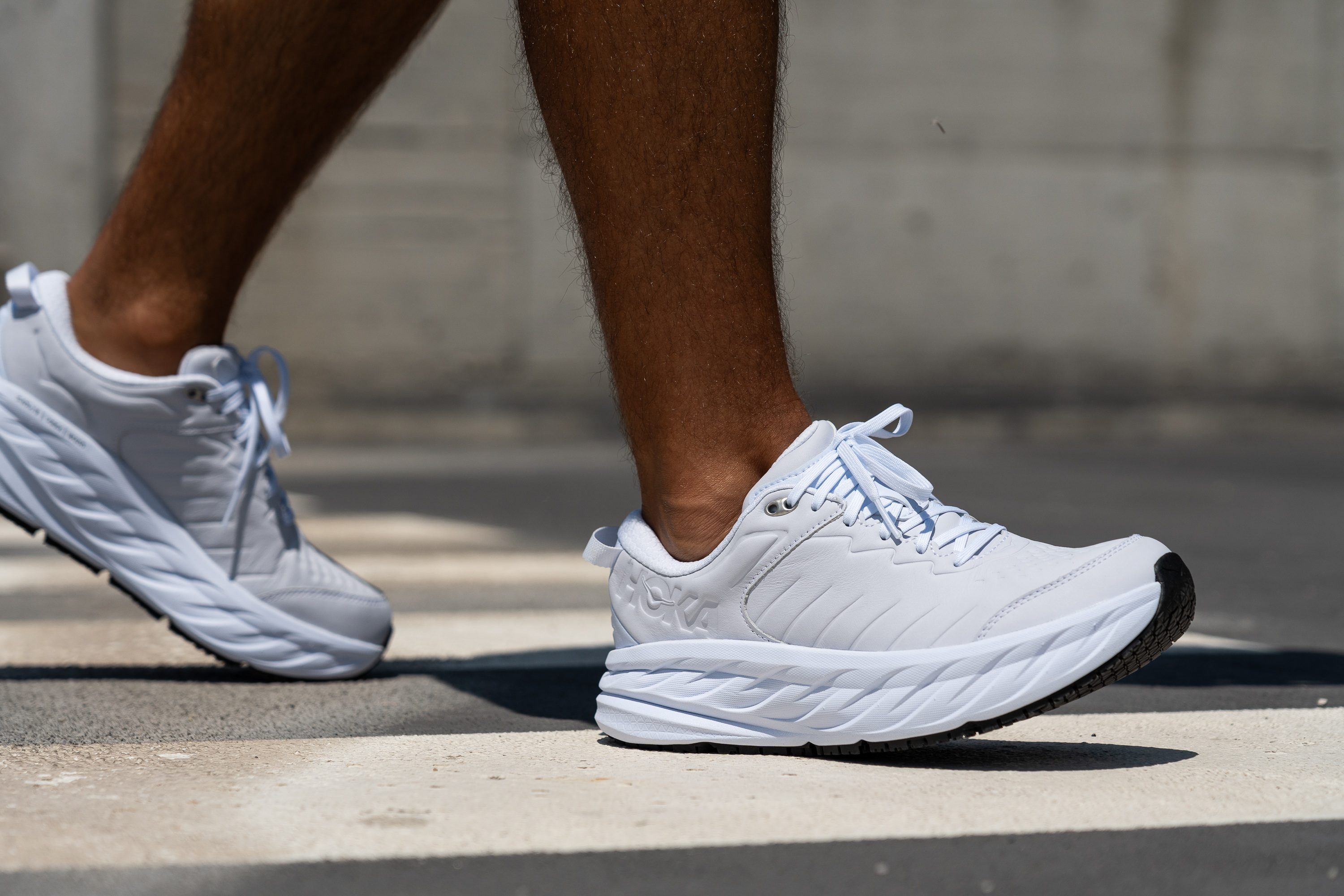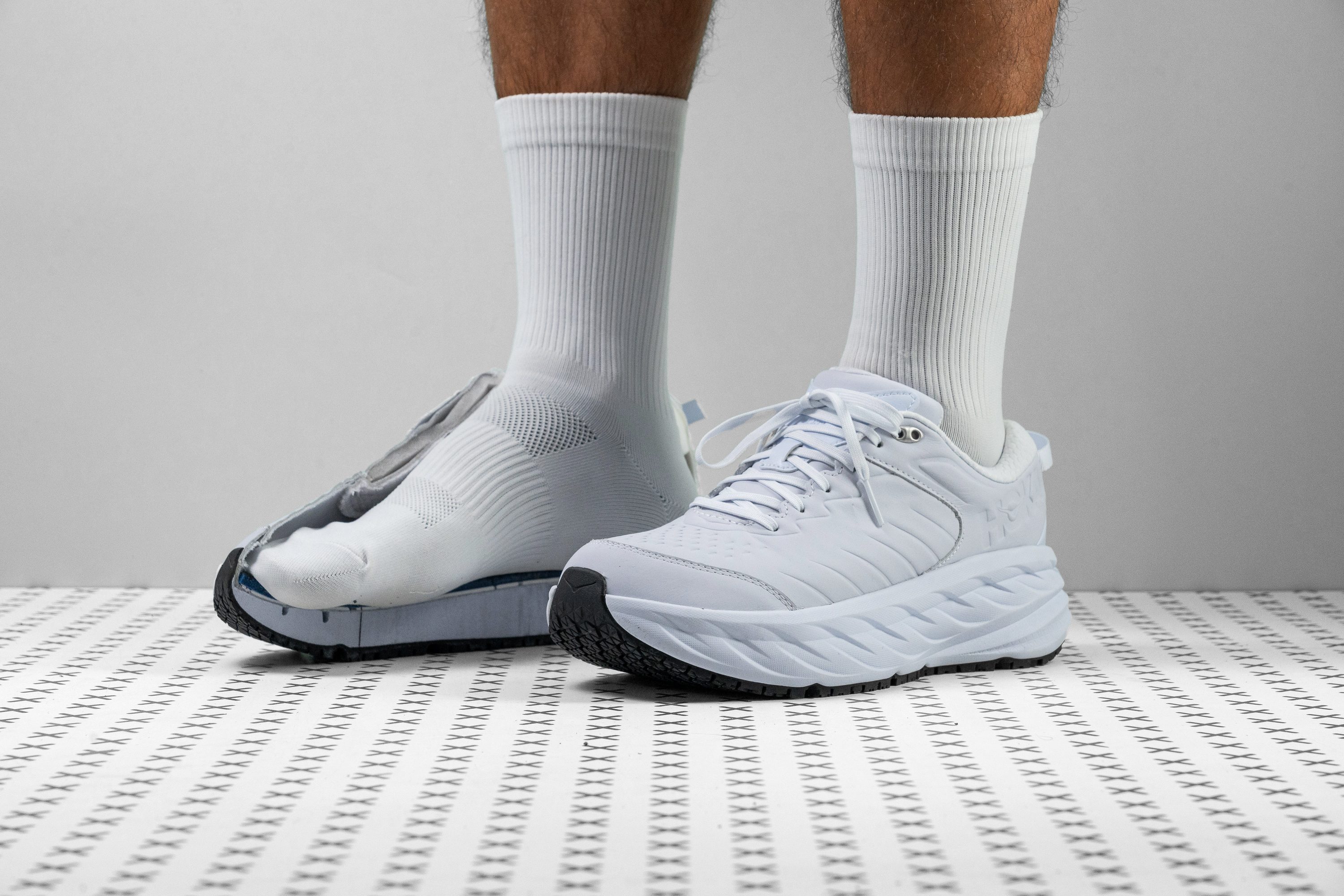Our verdict
- Top pick in best shoes for walking and standing all day
- Top pick in best shoes for nurses
Pros
- Comfort is off-the-charts
- Extra thick cushioning for all-day support
- Smooth heel-to-toe transitions
- Alleviates foot discomfort (podiatrist approved)
- Stable for a neutral shoe
- Truly slip-resistant outsole
- Superior material quality
- Water-resistant leather upper
- Accommodating toebox
Cons
- Heavy and bulky
- Not breathable
Audience verdict
- Top 6% most popular walking shoes
Comparison
The most similar walking shoes compared
+ + Add a shoe | |||||
|---|---|---|---|---|---|
| Audience score | 84 Good! | 90 Great! | 82 Decent! | 86 Good! | |
| Price | £180 | £150 | £130 | £130 | |
| Arch support | Neutral | Neutral | Neutral | Stability | |
| Shock absorption | Moderate | High | Moderate | Moderate | |
| Energy return | Moderate | High | Moderate | Moderate | |
| Traction | High | High | - | Moderate | |
| Condition | - | - | - | Diabetic (A5500)Flat feetOverpronation | |
| Orthotic friendly | ✓ | ✓ | ✓ | ✓ | |
| Weight lab Weight brand | 14.3 oz / 404g 14 oz / 397g | 9.4 oz / 266g | 10.9 oz / 309g 10.9 oz / 309g | 13.7 oz / 388g 14.5 oz / 411g | |
| Lightweight | ✗ | ✓ | ✗ | ✗ | |
| Breathability | Warm | Warm | Warm | Warm | |
| Use | For standing all dayWorkCityDisneyEuropeFor nurses | For standing all dayTravelCityDisneyEuropeFor nurses | For standing all dayCityDisneyEurope | WorkEuropeFor nurses | |
| Size | True to size | True to size | True to size | True to size | |
| Midsole softness | Balanced | Balanced | Balanced | Balanced | |
| Difference in midsole softness in cold | Big | Normal | Big | Small | |
| Insole thickness | Average | Very thin | Average | Average | |
| Removable insole | ✓ | ✓ | ✓ | ✓ | |
| Stiffness | Stiff | Moderate | Stiff | Stiff | |
| Torsional rigidity | Stiff | Stiff | Stiff | Stiff | |
| Heel counter stiffness | Stiff | Flexible | Moderate | Moderate | |
| Heel tab | Finger loop | None | Finger loop | None | |
| Drop lab | 8.2 mm | 8.7 mm | 8.0 mm | 12.2 mm | |
| Heel stack lab | 39.4 mm | 35.5 mm | 34.1 mm | 35.7 mm | |
| Forefoot | 31.2 mm | 26.8 mm | 26.1 mm | 23.5 mm | |
| Width / fit | Medium | Medium | Narrow | Narrow | |
| Toebox width | Wide | Medium | Narrow | Narrow | |
| Closure | Laces | Bungee laces | Bungee laces | Laces | |
| Toebox durability | Good | Good | Good | Good | |
| Heel padding durability | Bad | Bad | - | Good | |
| Outsole durability | Bad | Good | - | Good | |
| Midsole width - forefoot | Very wide | Wide | Average | Average | |
| Midsole width - heel | Very wide | Wide | Average | Average | |
| Outsole hardness | Average | Average | Average | Average | |
| Outsole thickness | Thick | Average | Average | Thick | |
| Tongue padding | Thick | Average | Average | Thick | |
| Tongue: gusset type | None | Both sides (semi) | None | None | |
| Slip-resistant | ✓ | ✗ | ✗ | ✓ | |
| Material | Leather | Mesh | - | Leather | |
| Ranking | #30 Bottom 16% | #16 Top 45% | #34 Bottom 5% | #29 Bottom 19% | |
| Popularity | #2 Top 6% | #4 Top 12% | #3 Top 9% | #6 Top 17% |
Who should buy
Based on its design features and lab performance, we believe that the Hoka Bondi SR is perfect for the following:
- individuals in need of a practical yet cosy and good-looking shoe for work or casual wear
- employees who often deal with wet floors at work (hospitals, restaurants, kitchens, etc.)
- people with plantar fasciitis and other foot issues that call for podiatrist-approved footwear
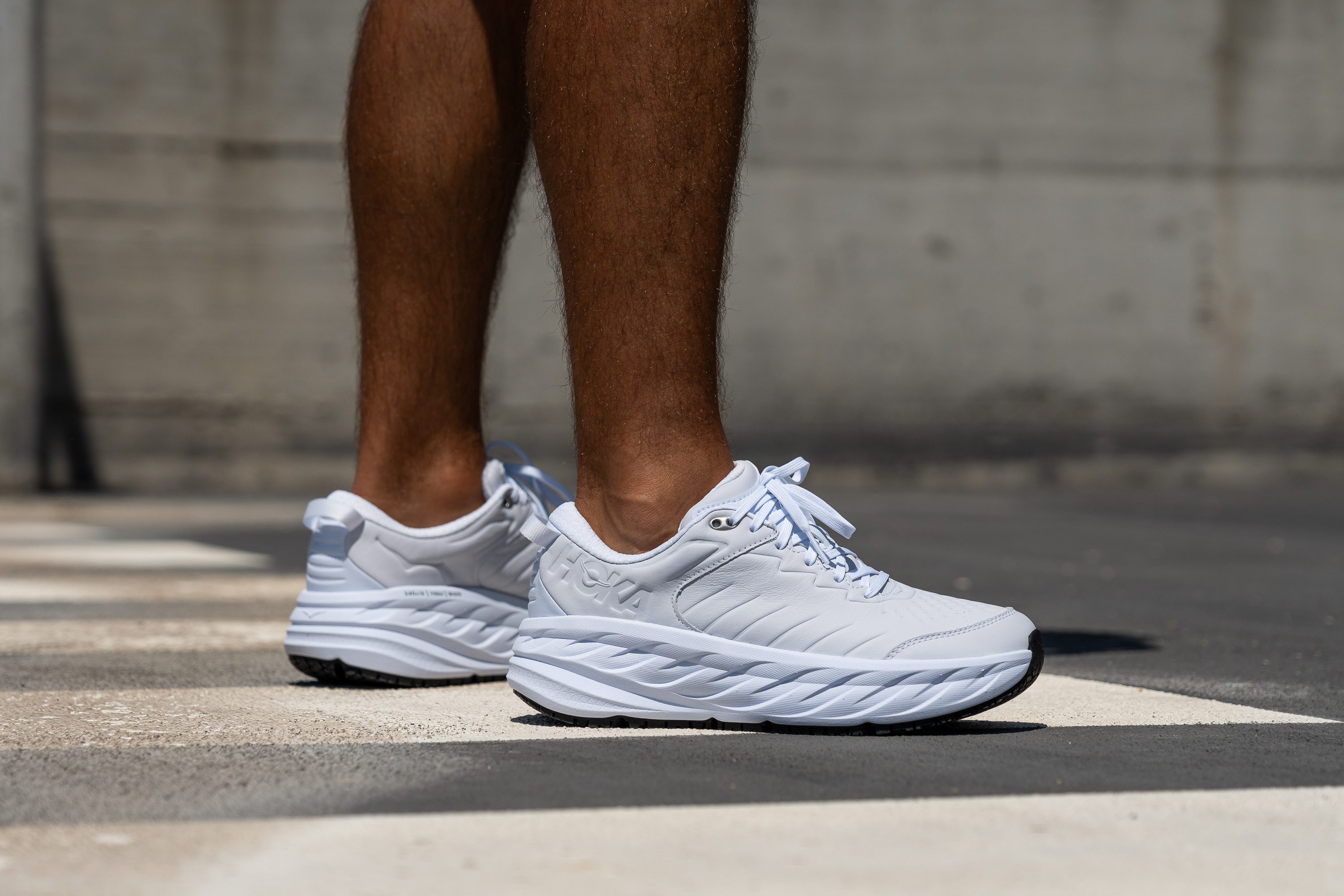
Cushioning
Shock absorption
Even though we expected a much higher shock absorption measurement from a platformy shoe like the HOKA Bondi SR, we are pleased with the 111 SA reading it showed.
This guarantees the necessary impact protection and all-day support even if you spend a 12-hour shift on your feet!
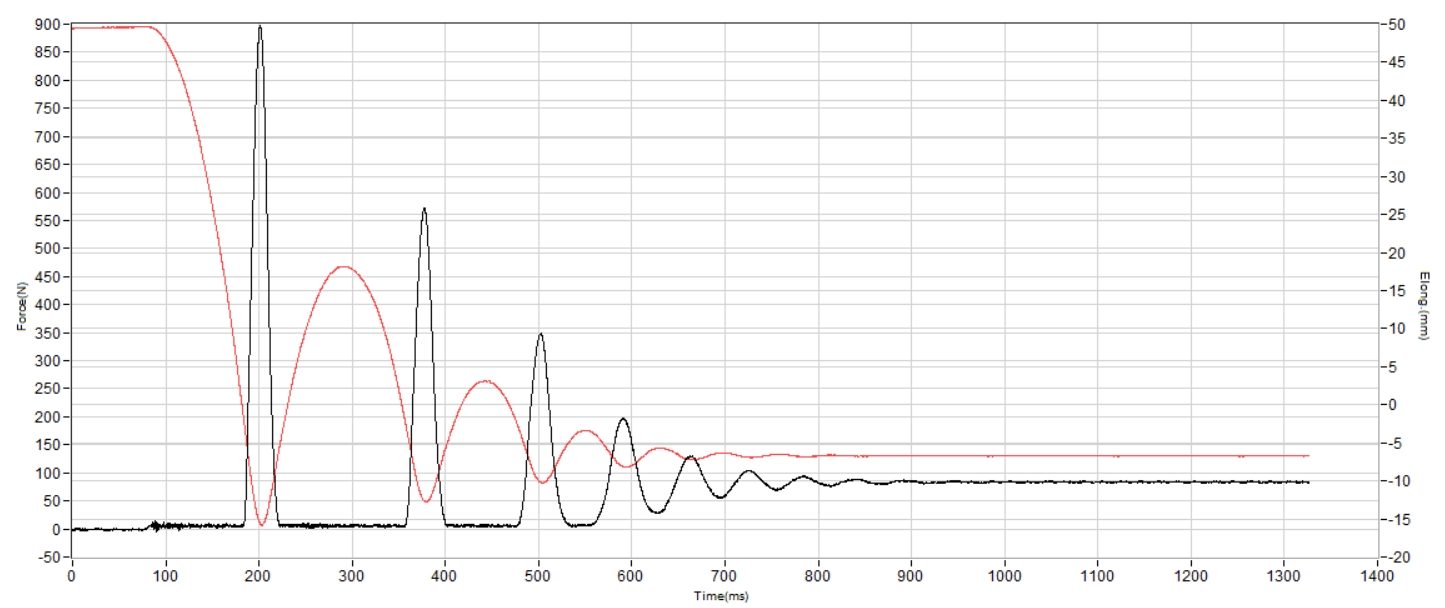
| Hoka Bondi SR | 111 SA |
| Average | 111 SA |
Energy return
Considering the shoe's intended purpose, a stable and supportive platform is more important than rebound in the Bondi SR. Its moderate energy return of 47.1% helps to create a more planted and surefooted base for workers in healthcare and other industries.
| Hoka Bondi SR | 47.1% |
| Average | 51.1% |
Heel stack
The cushioning unit is simply HUGE in this walking shoe from Hoka.
Using a calliper, we measured the stack height at 39.4 mm in the heel. That's a crazy 8 mm thicker than average!
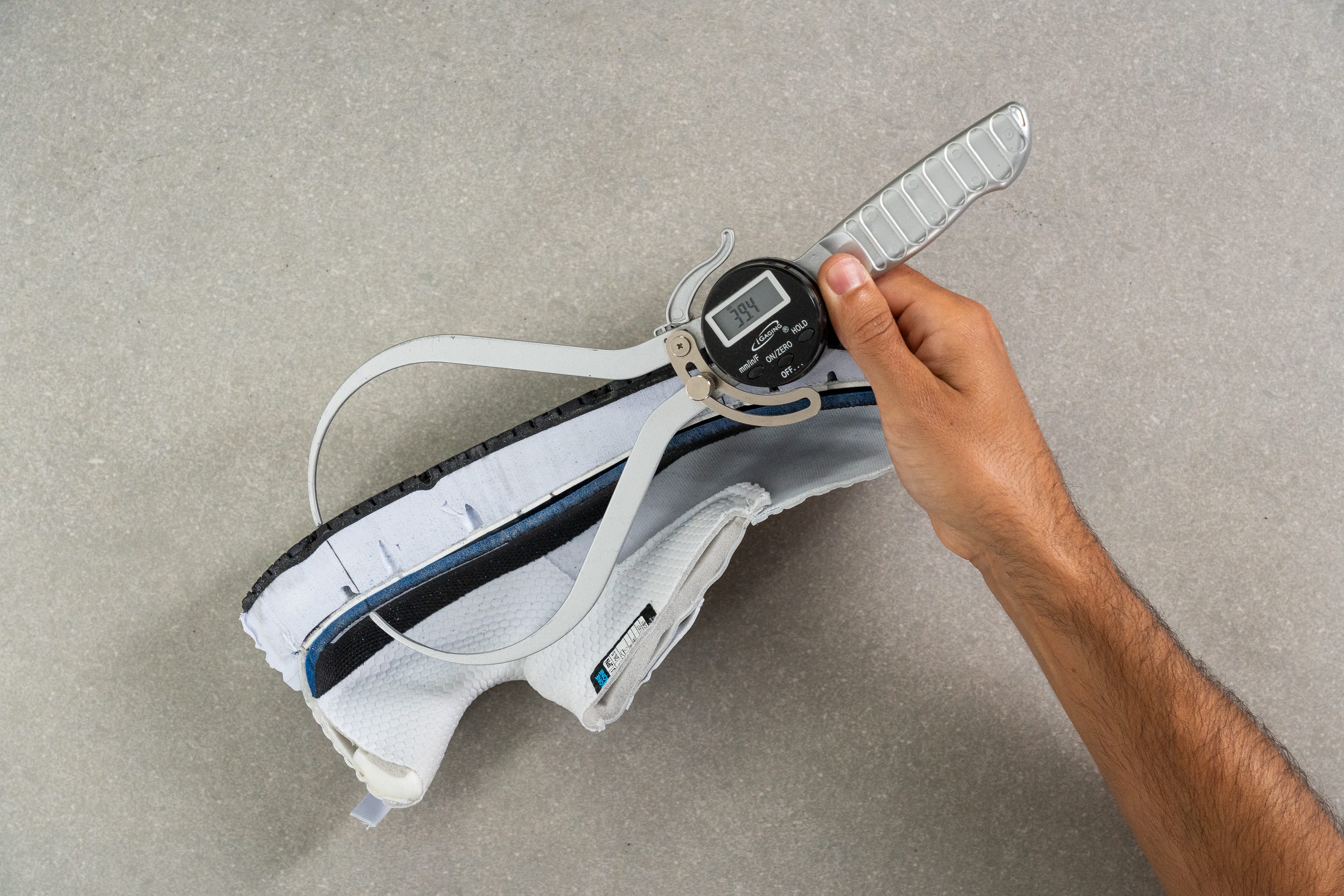
| Hoka Bondi SR | 39.4 mm |
| Average | 32.3 mm |
Forefoot stack
In the forefoot, the Bondi SR is as thick as many other walking shoes are in their heels.
Our calliper shows 31.2 mm of thickness under the toes. We felt as if the shoe's cushioning was bottomless.
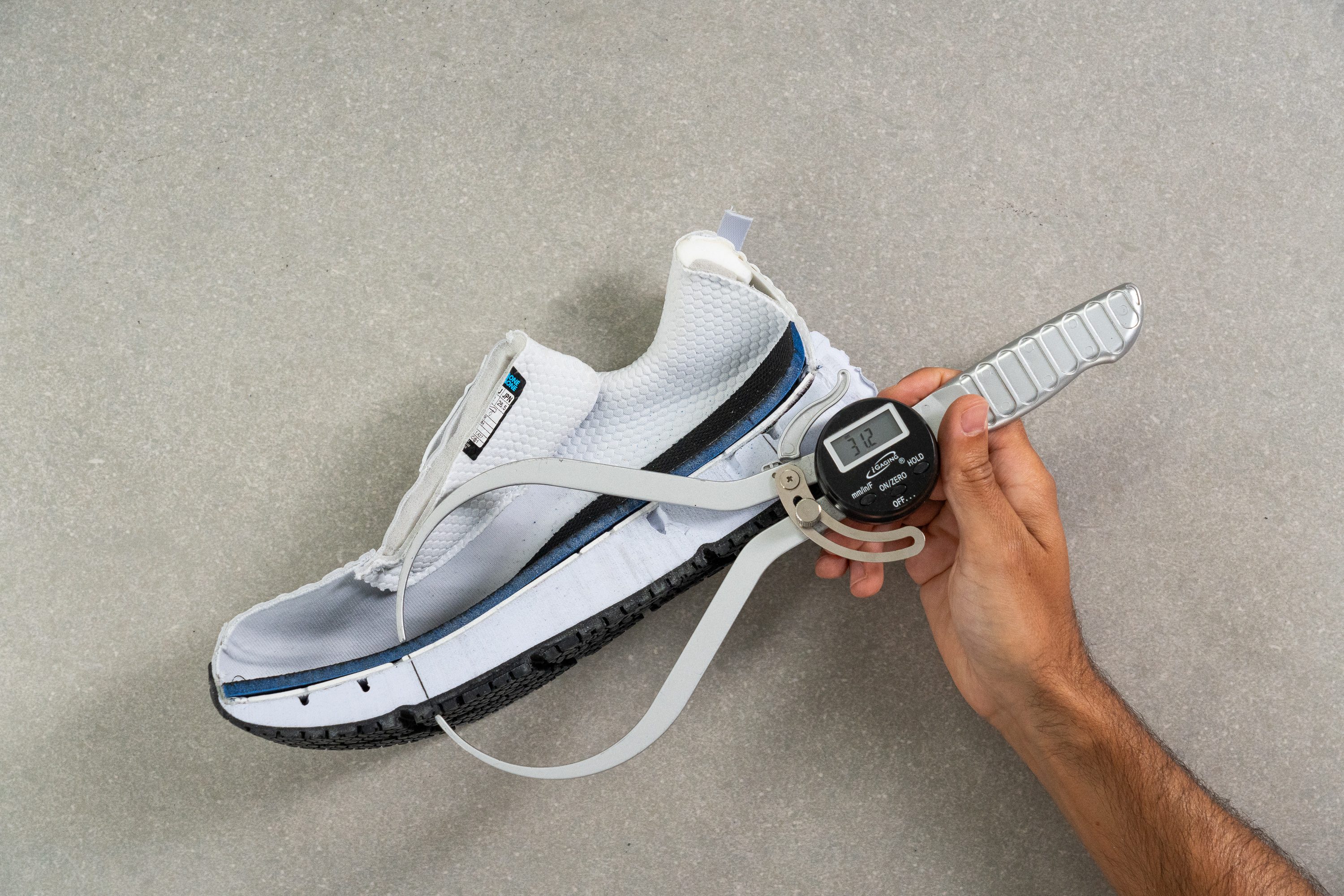
| Hoka Bondi SR | 31.2 mm |
| Average | 21.9 mm |
Drop
Based on the stack measurements above, we found that the heel-to-toe drop of the Hoka Bondi SR is 8.2 mm. This is a little taller than the officially stated 6 mm.
But you won't even notice the difference while floating atop this cloud-like cushion.
In addition, 8-10 mm is a pretty standard heel elevation for a walking shoe. It provides even more landing comfort for the heels as opposed to the lower-drop shoes that feel more barefoot-like.
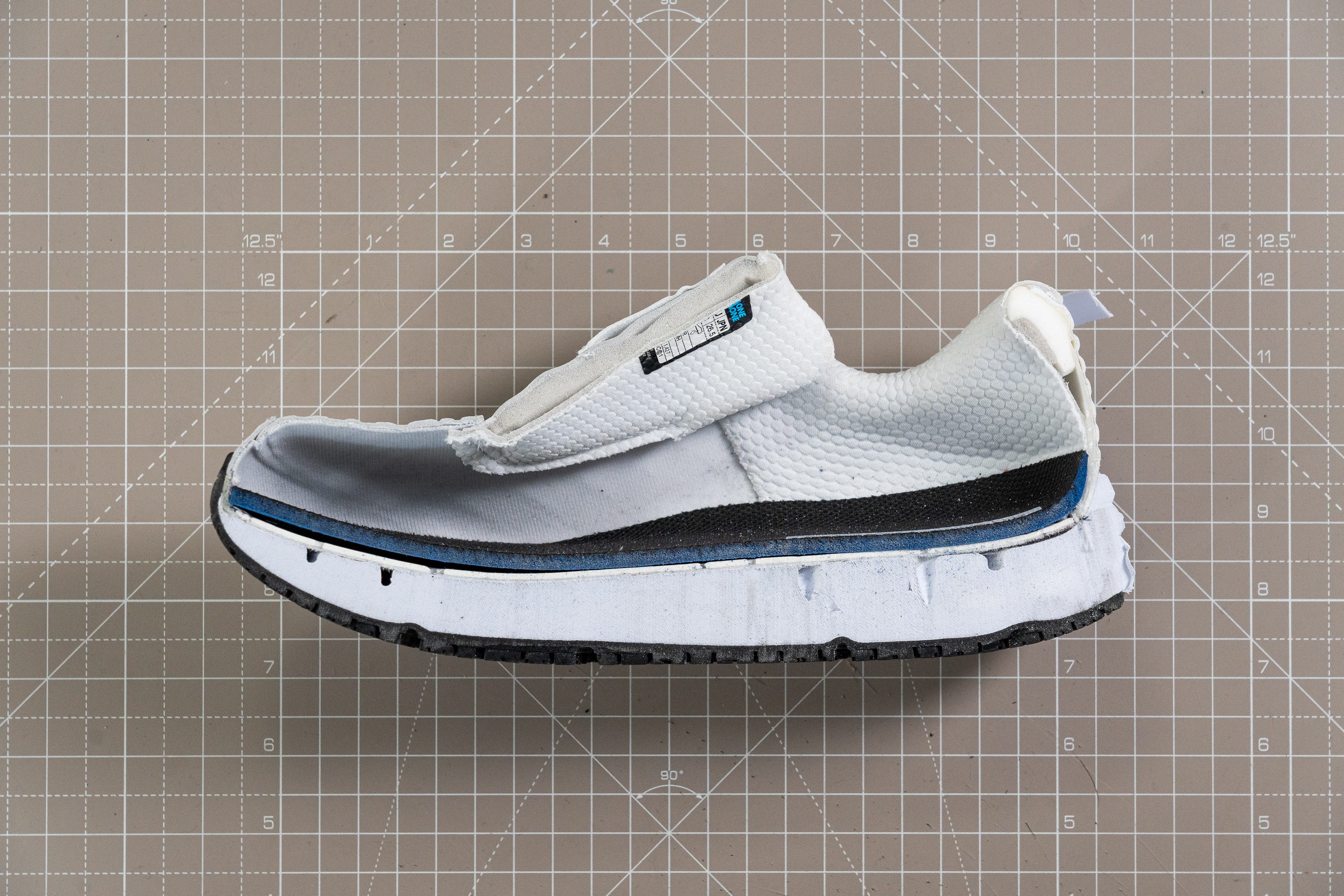
| Hoka Bondi SR | 8.2 mm |
| Average | 10.4 mm |
Midsole softness
UpdatedOn its official product page, Hoka categorises the Bondi SR's cushioning as plush. And we can subscribe to that statement after measuring the shoe's softness with an Asker C durometer.
Recording a reading of 42.1 AC, we found it slightly softer than the average walking-shoe foam. And on foot, we did experience a very pleasant squish all throughout the midsole.
The Hoka Bondi SR is actually built on the basis of the Hoka Bondi running shoe, inheriting all of its cushioned goodness.
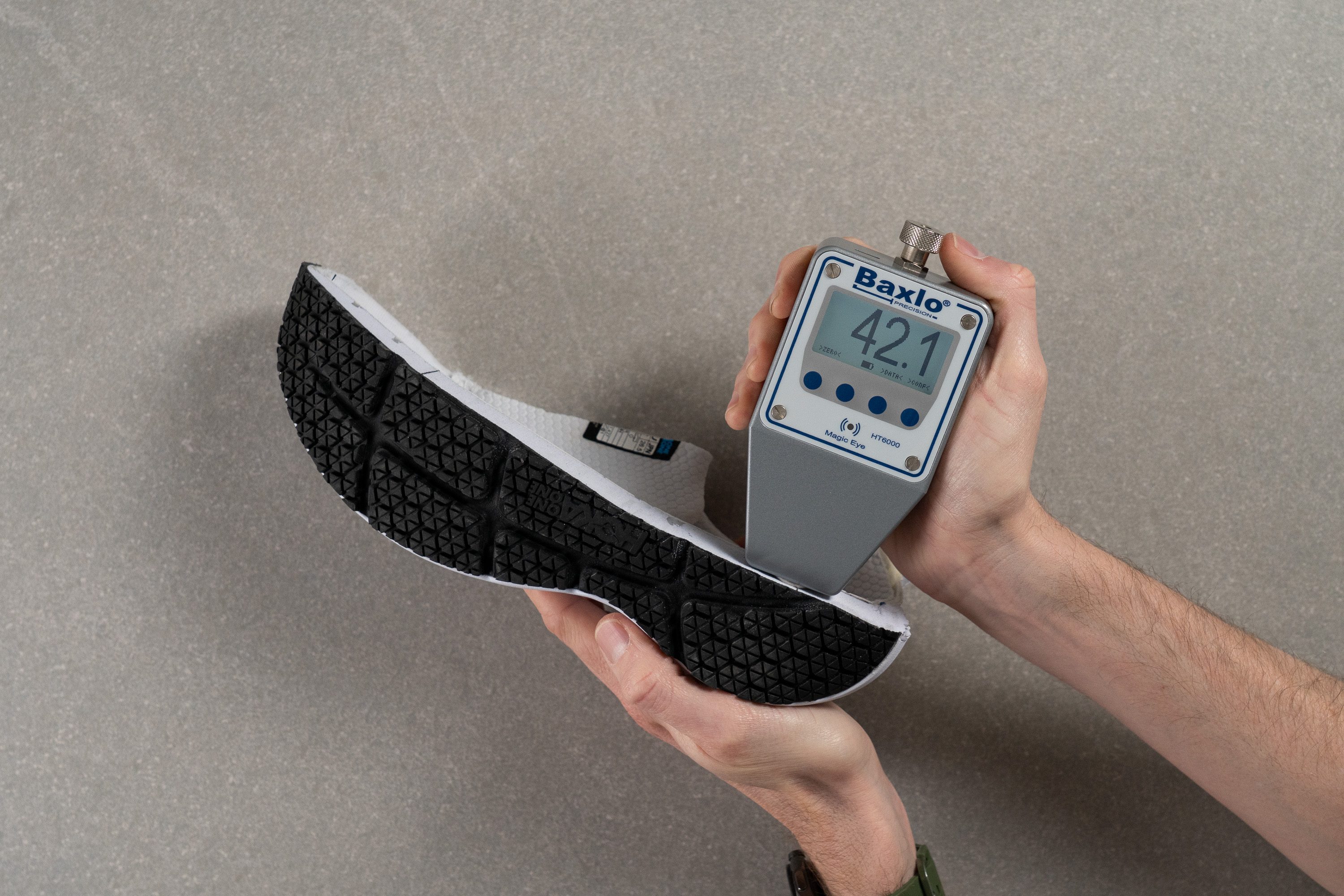
| Hoka Bondi SR | 42.1 AC |
| Average | 48.2 AC |
Rocker
The shoe's midsole has a curvy shape on purpose. As part of the brand's proprietary Early Stage Meta-Rocker design, it is meant to provide smooth transitions from heels to toes.
This design really worked wonders as it felt like we were actually rockered into the next step.
Size and fit
Size
Hoka Bondi SR fits true to size (566 votes).
Toebox width - widest part
The Hoka Bondi SR has a marvelously accommodating fit! Whether you have wide feet, or bunions, or simply enjoy extra space for splaying your toes, this shoe has it all covered.
In the widest part of the toebox, we measured the shoe's width at 100.3 mm, 2.6 mm wider than average.
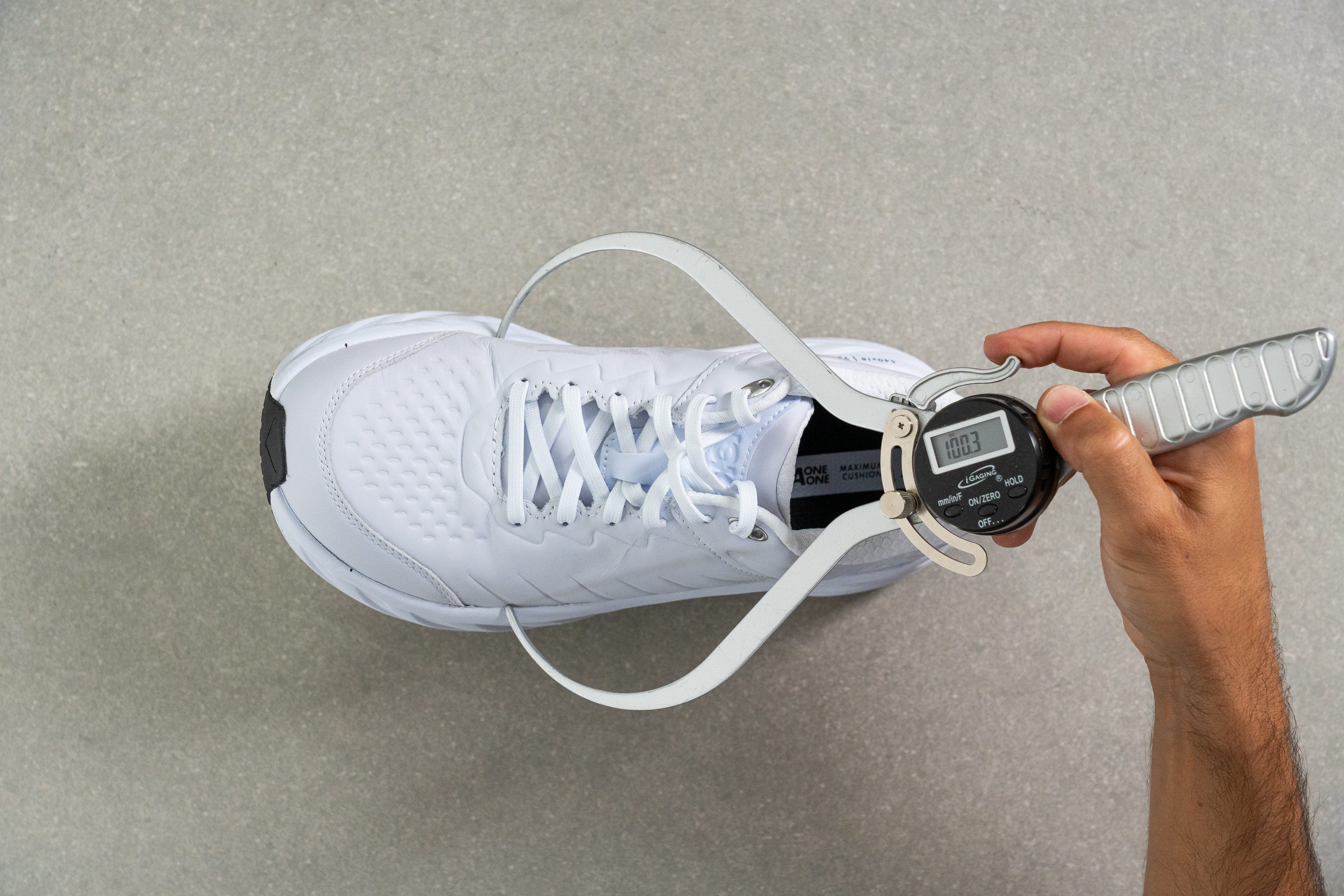
This test follows an older methodology, which is why you don't see recently tested shoes in the chart. Results from different methodologies can not be compared.
| Hoka Bondi SR | 100.3 mm |
| Average | 99.2 mm |
Toebox width - big toe
But the most surprising part is the toebox width at the big-toe mark. The caliper shows 81.2 mm which is 2.7 mm wider than average.
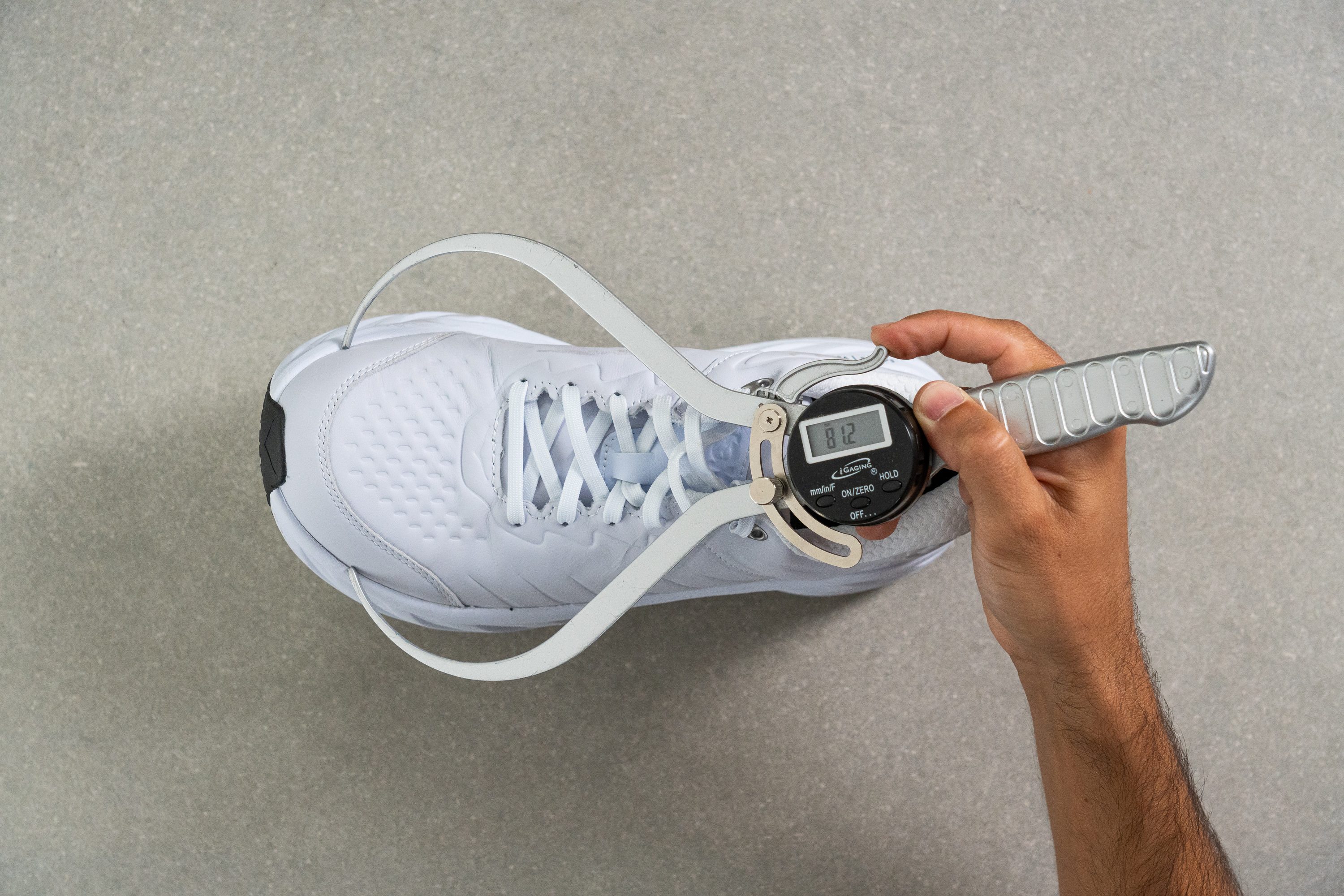
This test follows an older methodology, which is why you don't see recently tested shoes in the chart. Results from different methodologies can not be compared.
| Hoka Bondi SR | 81.2 mm |
| Average | 78.6 mm |
Traction / Grip
The grip is insanely good in the Hoka Bondi SR. This walking shoe totally lives up to the marketing around it (SR stands for slip-resistant).
Kitchens, hospitals, warehouses - this shoe nails it when you have to speed through wet tiles or any other slick surfaces.

Traction test
We are happy to confirm that the Hoka Bondi SR lives up to the marketing around it (SR stands for slip-resistant) as its grip is insanely strong.
Following a SATRA TM144 method, we checked how much friction the shoe provides upon heel landing (the most slip-prone part of the walking gait cycle). The result was stunning as the Bondi SR showed some of the highest friction coefficients we've ever recorded in the lab - 0.77!
Kitchens, hospitals, warehouses - this shoe nails it when you have to speed up and take sharp turns on wet tile or any other slick surface.
| Hoka Bondi SR | 0.77 |
| Average | 0.46 |
Outsole design
The entire length of the Hoka Bondt SR is covered with slip-resistant rubber for maximum surefootedness. However, that doesn't stop the shoe from having deep flex grooves for a smoother ride.
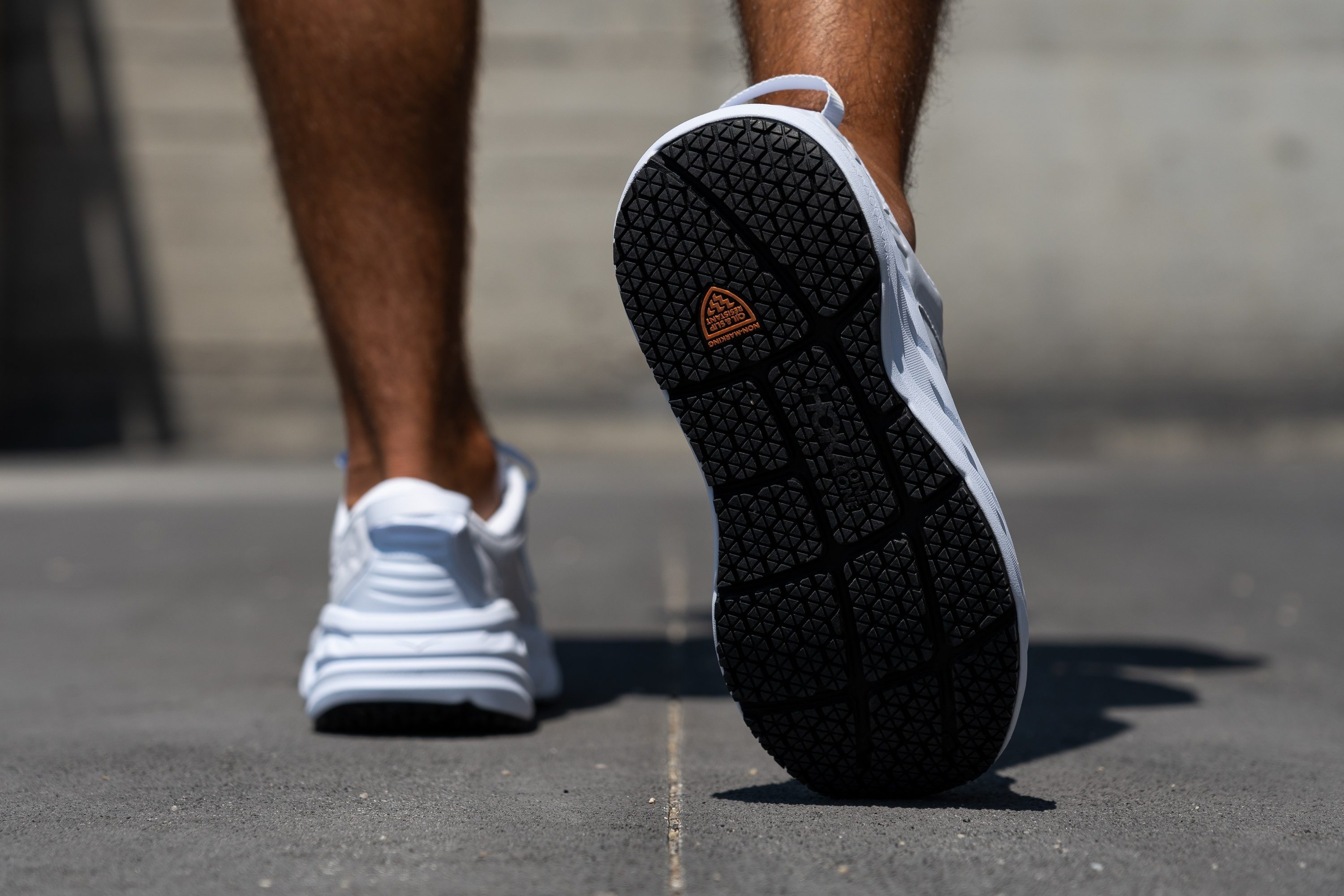
Flexibility / Stiffness
Bending the foot is just not happening in the Bondi SR. It is nearly impossible to flex this monster sole.
In our lab, it took a whopping 27.4N of force to bend this Hoka shoe to a 30-degree angle. A whole 100% more than it takes on average!
The Hoka Bondi SR shoe makes you forget about normal foot gait. Instead, it makes you feel like you have small cushy boats attached to your feet.
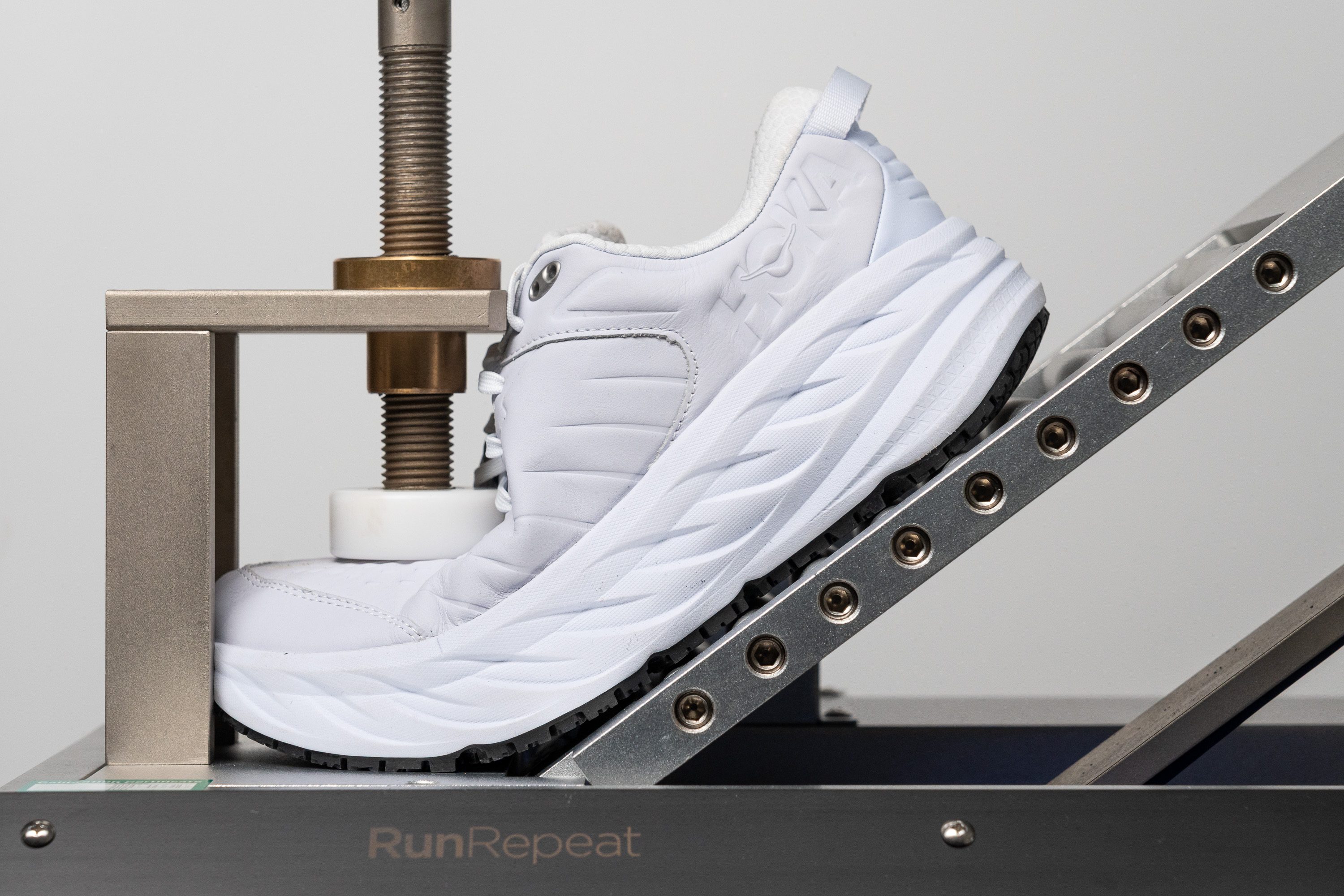
| Hoka Bondi SR | 27.4N |
| Average | 13.9N |
Weight
The Bondi SR is a pretty big boy.
It tips the scale at 14.3 oz (404g) in a men's US size 9 which is a whole 4.7 oz (132g) heavier than walking shoes on average!
However, we believe that it is a reasonable weight given how much cushioning and support this Hoka shoe provides.
| Hoka Bondi SR | 14.3 oz (404g) |
| Average | 10.2 oz (288g) |
Breathability
With the shoe's water-resistant upper made of genuine leather, we didn't expect much breathability in the first place.
We used a smoke-pumping machine to assess how much air passes through the Bondi SR's upper. As you can see, it all gets trapped inside the shoe's sealed leather upper. Thus, the shoe gets the lowest breathability score of 1 out of 5.
As you can also see from our transparency test below, there is not a single perforation on the shoe's upper to let the heat out.
We even tried looking for some ventilation holes with a microscope but to no avail. This shoe is practically air-tight.
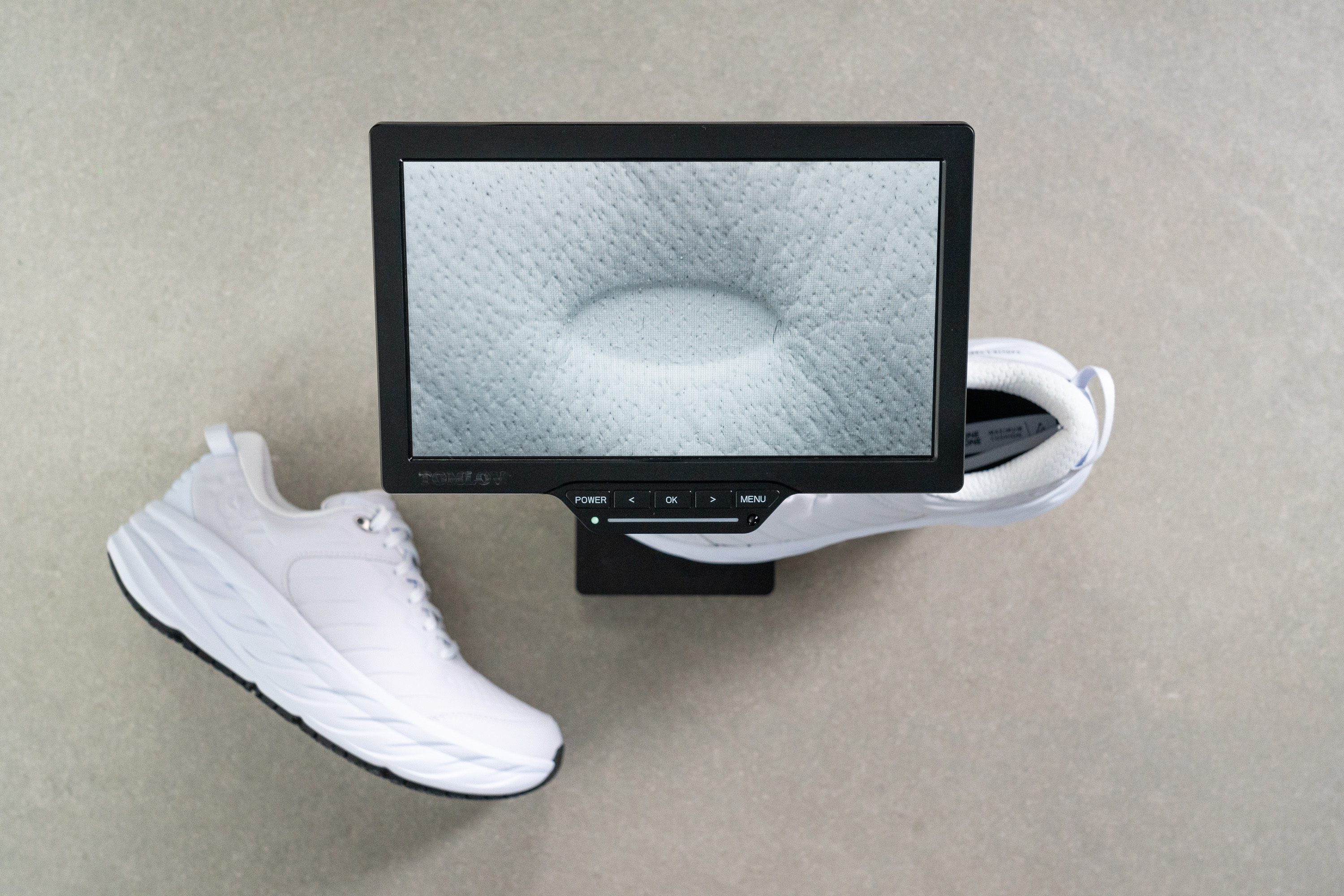
| Hoka Bondi SR | 1 |
| Average | 2.9 |
Stability
Lateral stability test
The Hoka Bondi SR is meant for neutral pronation as well as supination (excessive outward ankle rolling). But there is so much support woven into every aspect of the shoe that we think it could also heel at home for mild overpronation (inward ankle rolling).
Torsional rigidity
First of all, the Bondi SR is incredibly stiff. So much so that we couldn't even twist it in our manual test. There is no give whatsoever, earning the shoe the highest score for torsional rigidity: 5 out of 5.
This is what makes this walking shoe feel so stable in the first place.
| Hoka Bondi SR | 5 |
| Average | 2.9 |
Heel counter stiffness
Another important stability component is the heel counter stiffness. Having pushed and squeezed it in every way, we rated its stiffness as 4 out of 5 (nearly the stiffest!).
Paired with the generously padded collar and sturdy leather upper, it creates a very cosy yet secure clutch around the ankle.
This made the Hoka Bondi SR feel almost like a stability shoe!
| Hoka Bondi SR | 4 |
| Average | 2.4 |
Midsole width - forefoot
The footprint of the Hoka Bondi SR looks like that of a Bigfoot. No kidding!
This is the most massively wide platform we've seen in our lab.
In the widest part of the forefoot, our calliper shows 124.1 mm. This is more than a centimetre wider than the average!
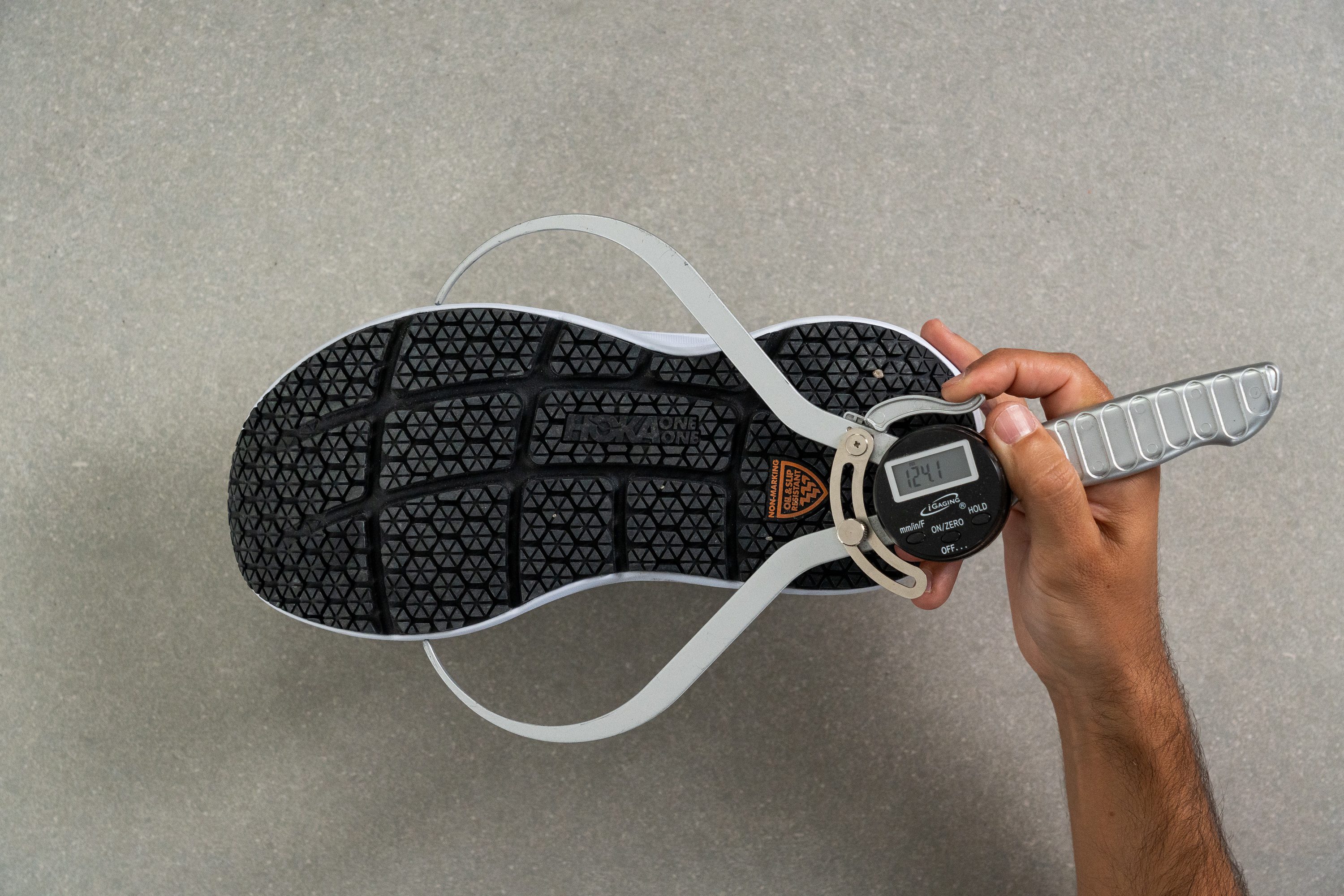
| Hoka Bondi SR | 124.1 mm |
| Average | 112.0 mm |
Midsole width - heel
The Bondi SR is just as astonishingly wide in the widest part of the heel - 102.2 mm. That is 15 mm wider than average!
Wow... With such a wide landing area, it doesn't get any more surefooted. This is another reason this Hoka shoe feels so safe in the workplace.
In addition, we can recommend this Bondi to seniors who are likely to appreciate plenty of stability underfoot.
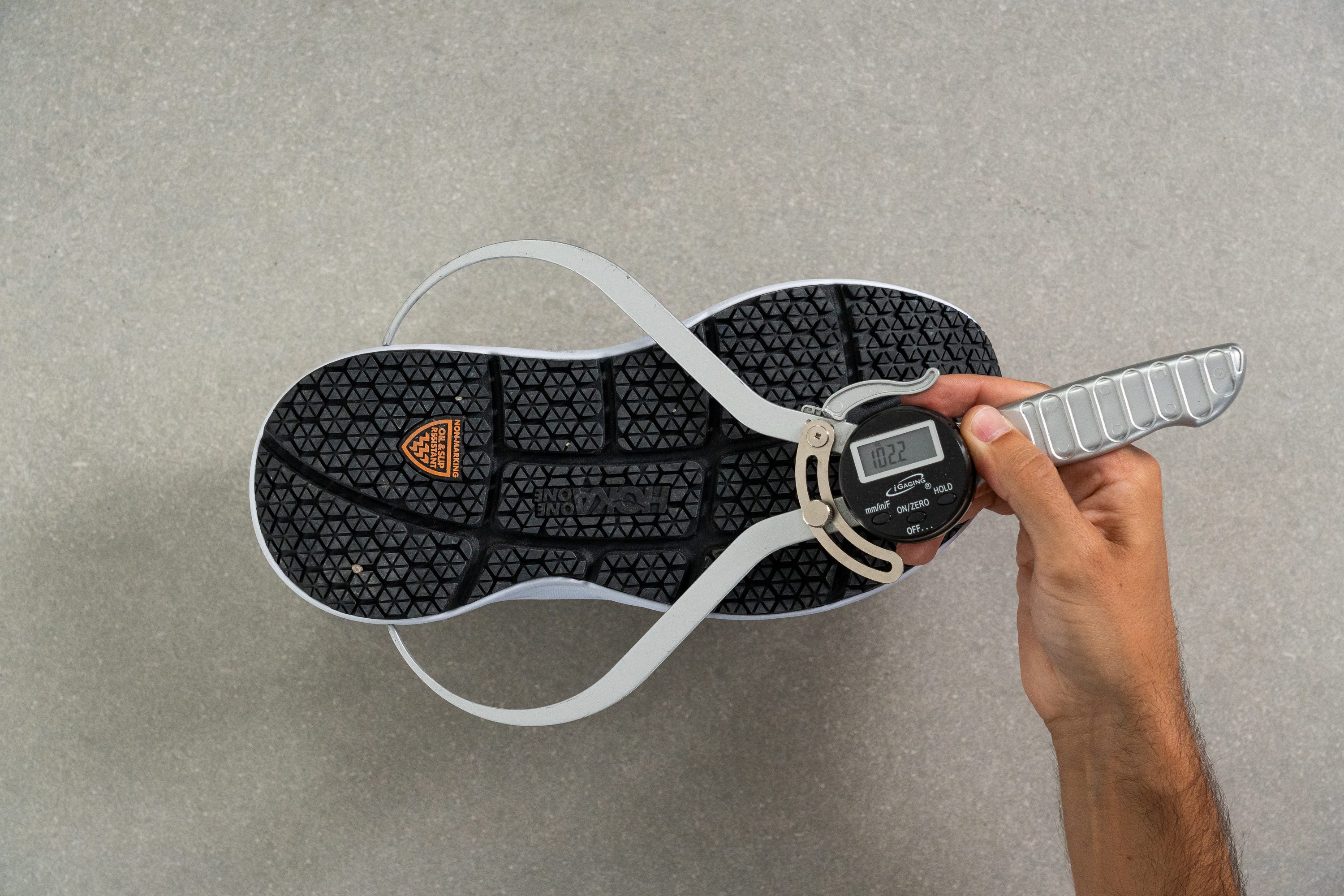
| Hoka Bondi SR | 102.2 mm |
| Average | 90.3 mm |
Durability
Toebox durability
On the upside, the shoe's leather upper is phenomenally wear-resistant. It is by far the most durable upper on a walking shoe that we've seen!
Applying a Dremel to the shoe's toebox for a whole 12 seconds, we didn't even get halfway through the material! It's going to take forever for this kind of upper to wear out. We believe that it justifies the shoe's above-average price.
To provide some perspective on the Bondi SR's durability, we put it next to another Hoka shoe. We applied the same force and speed of the Dremel to both shoes.
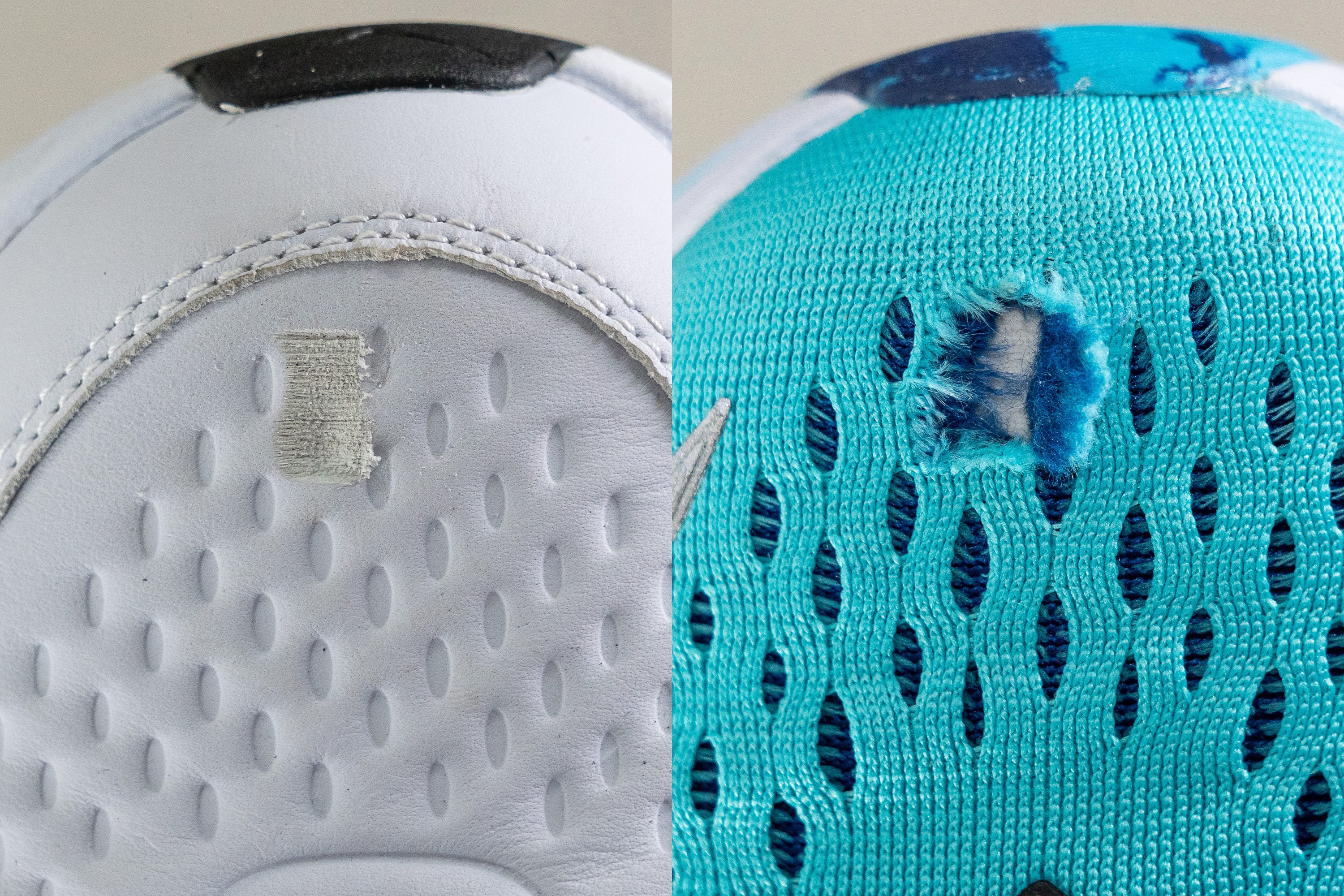
| Hoka Bondi SR | 5 |
| Average | 3.2 |
Heel padding durability
Unfortunately, the heel padding didn't do so well in our Dremel test, earning the lowest score of 1 out of 5.
Apparently, the brand went for softness at the expense of durability. Because we have seen some really sturdy heel linings. Look at the one from the Adidas Ultraboost for example. Doesn't even look like it was drilled!
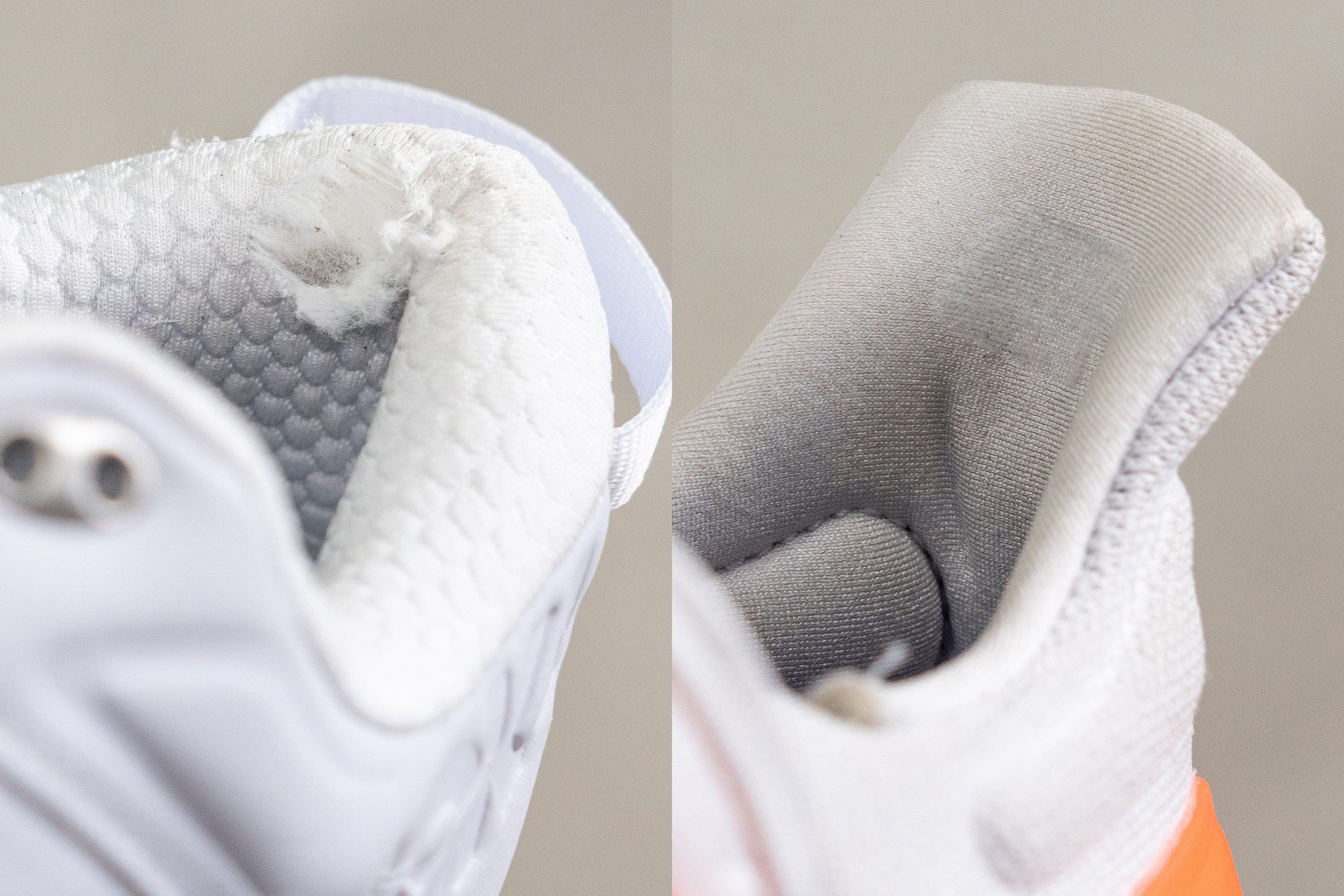
| Hoka Bondi SR | 1 |
| Average | 2.3 |
Outsole hardness
As a slip-resistant outsole, it is supposed to be on the soft side to provide a strong bite on smooth surfaces. Pressing our durometer against the rubber gave a reading of 73.1 HC, which is 6% softer than the average.
The downside is that the shoe has to give up some of its durability to achieve that level of grip.
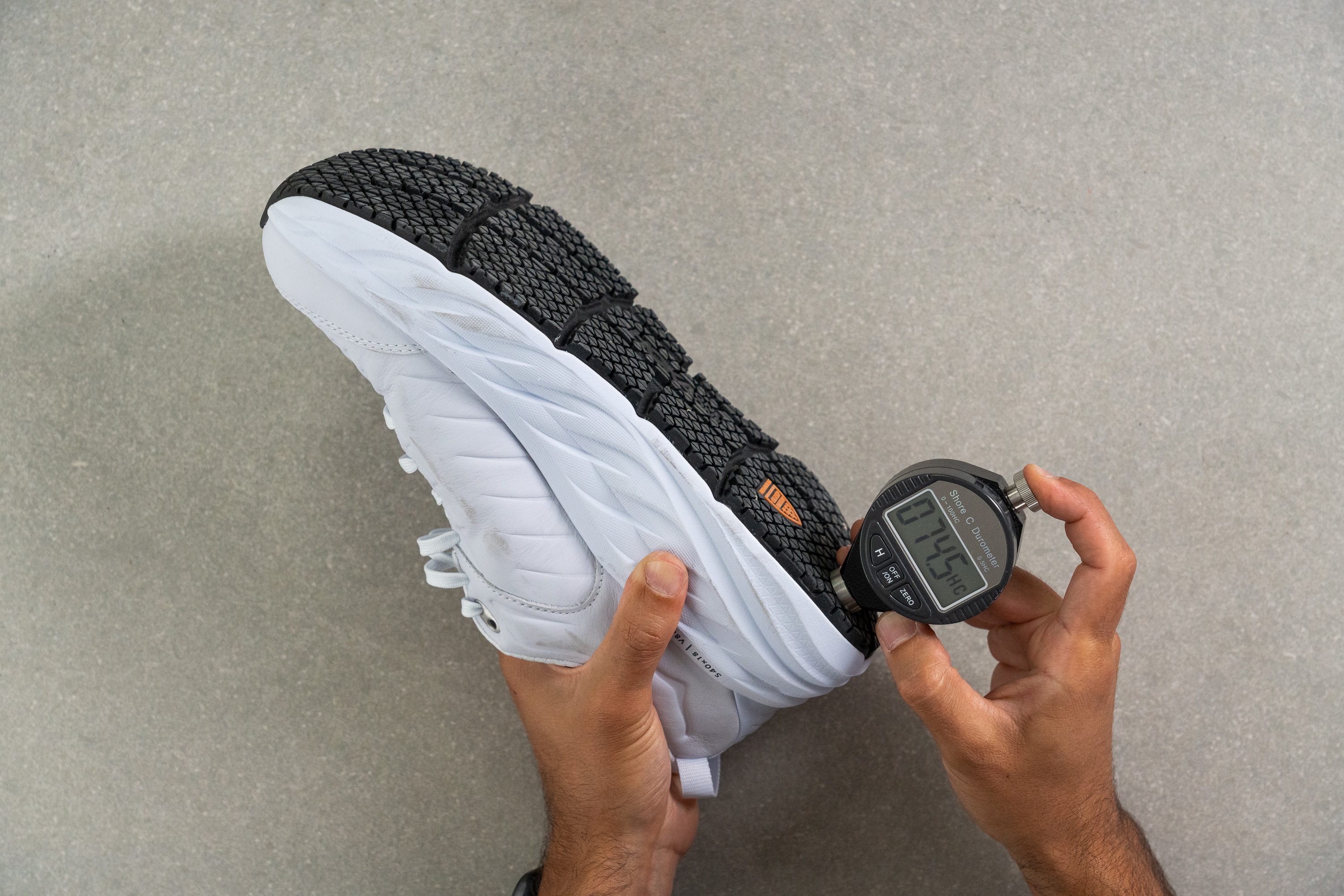
| Hoka Bondi SR | 73.1 HC |
| Average | 78.0 HC |
Outsole durability
Drilling the rubber with our Dremel felt like cutting butter with a knife. Within 22 seconds, the tool went right through the rubber down to the midsole.
We turned to a tread gauge to measure the depth of the emerged dent and it was a whopping 2.48 mm deep! For comparison, the average is only 1 mm.
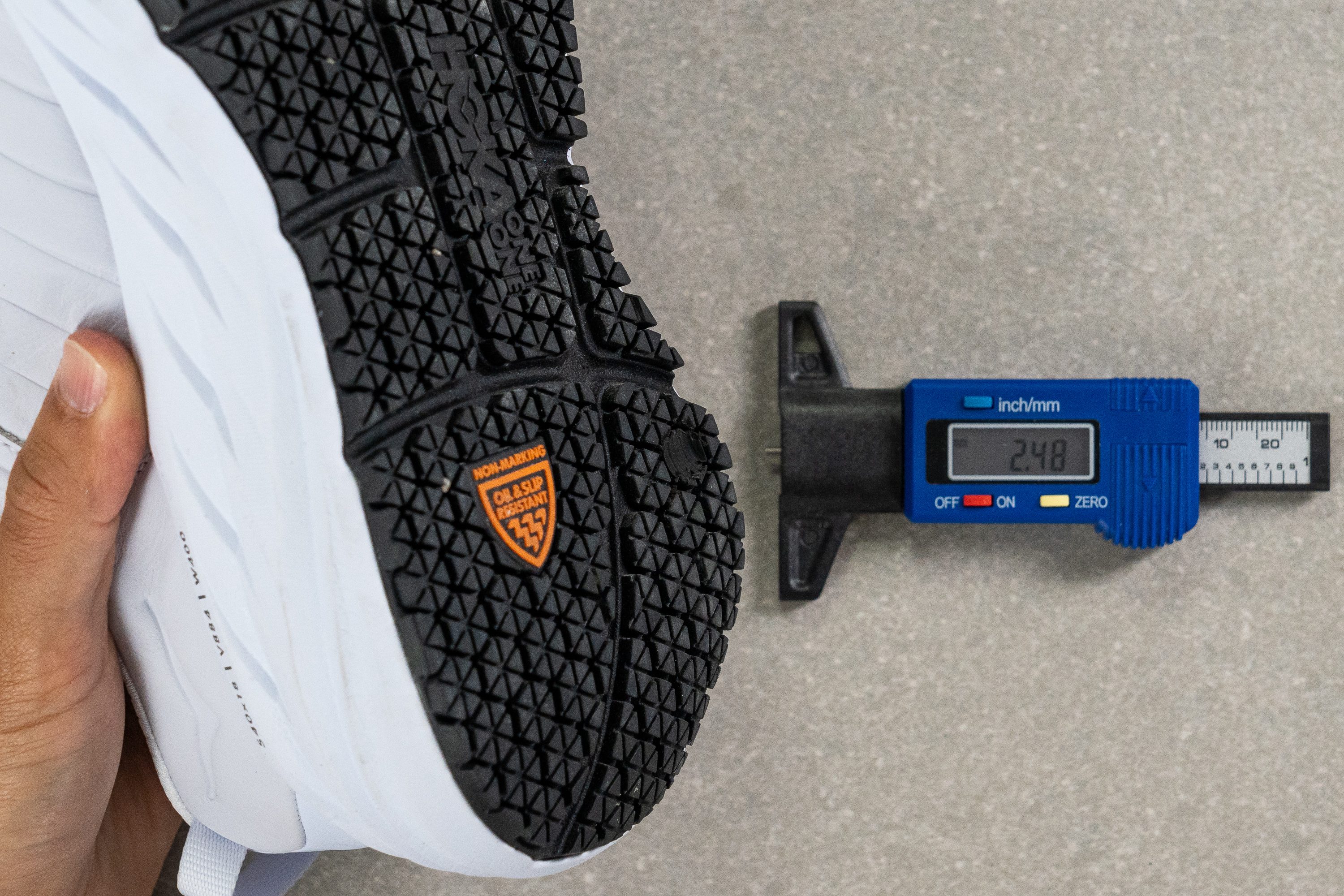
This is the trade-off that the Hoka Bondi SR makes to achieve its high level of slip resistance.
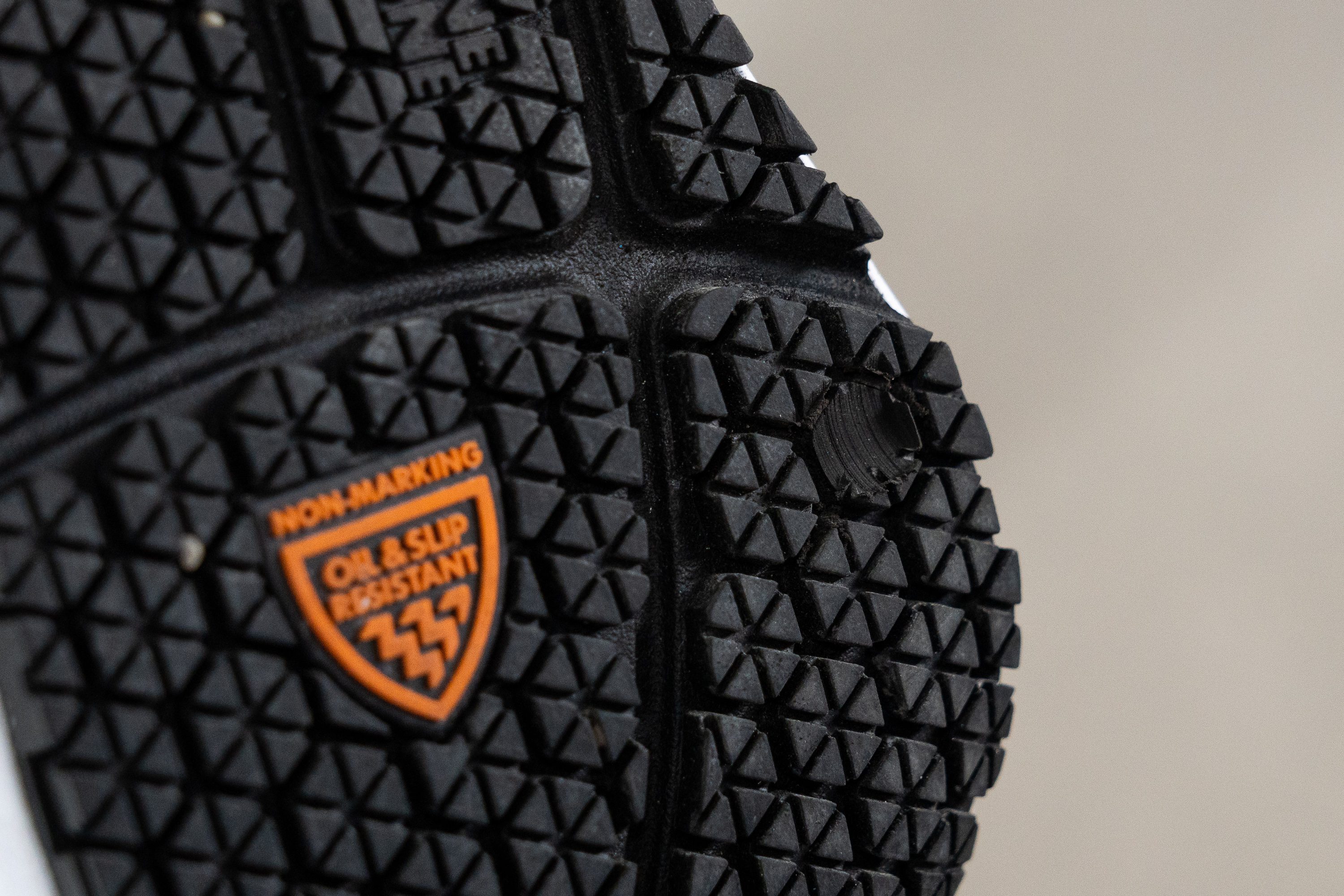
| Hoka Bondi SR | 2.5 mm |
| Average | 1.4 mm |
Outsole thickness
Good thing the shoe's rubber layer is a thick one. Our calliper shows 5.9 mm which is twice thicker than the average of walking shoes!
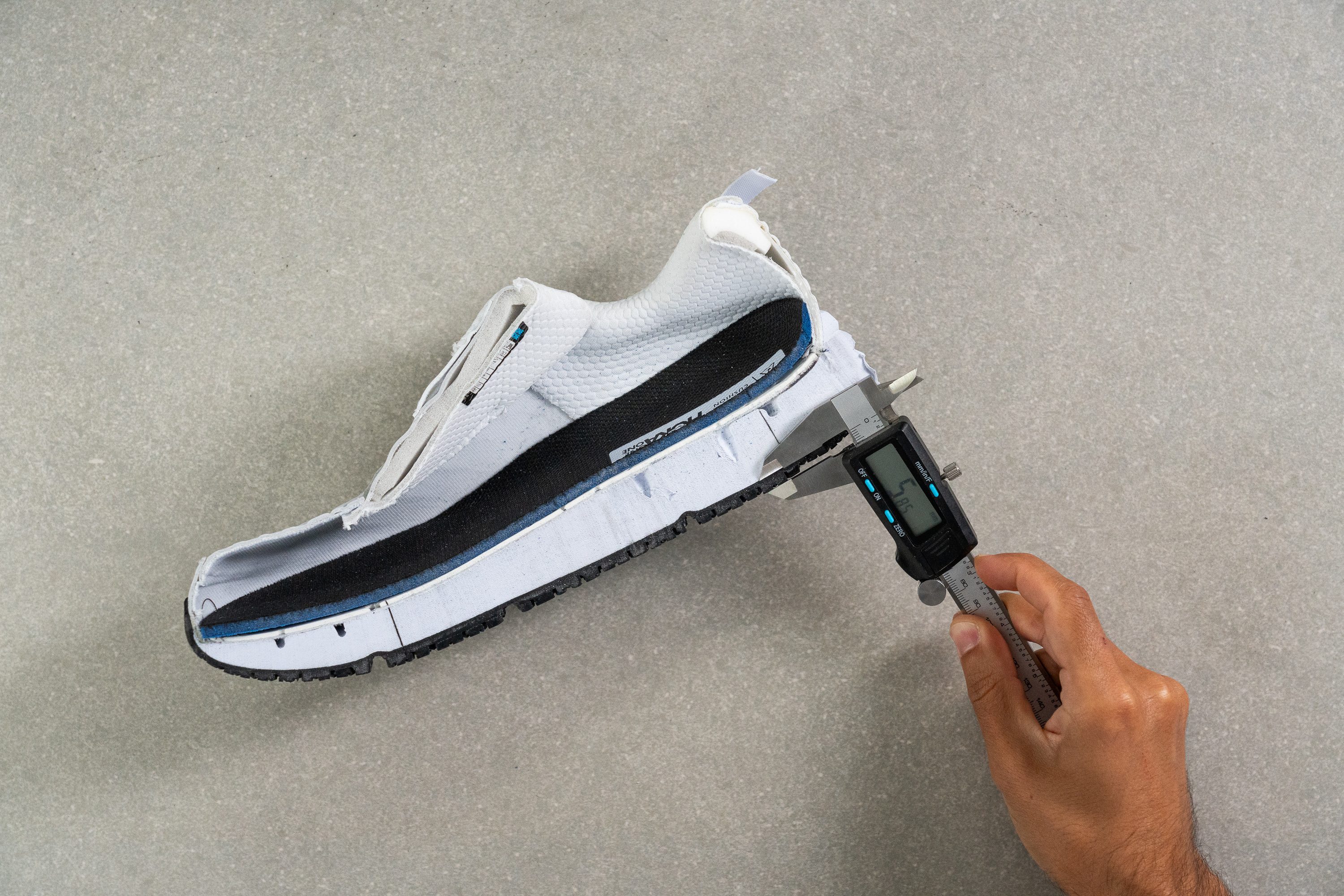
| Hoka Bondi SR | 5.9 mm |
| Average | 3.0 mm |
Misc
Insole thickness
The insole is also padded rather well in the Bondi SR. We measured its thickness at 4.9 mm, which is typical for walking shoes.
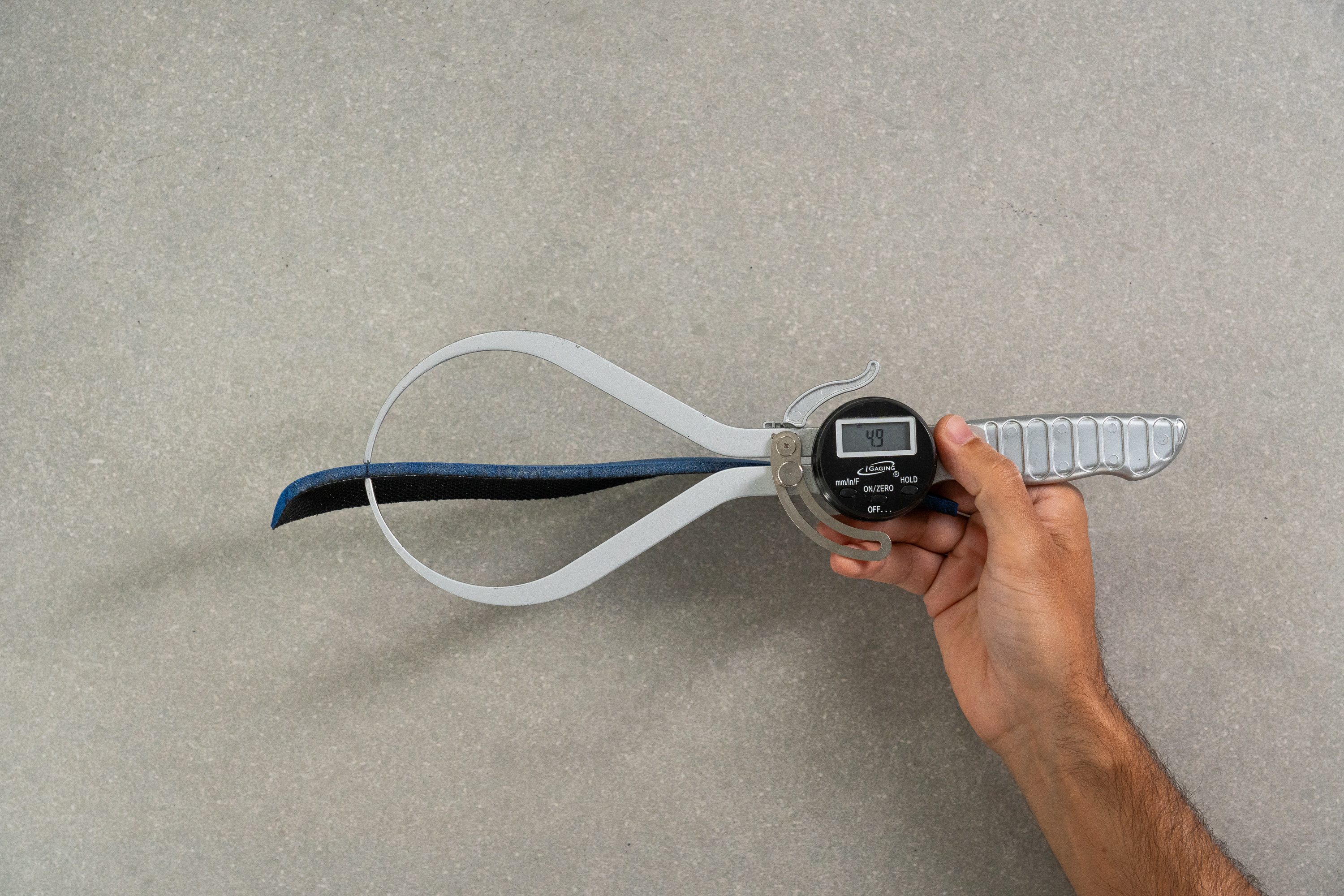
| Hoka Bondi SR | 4.9 mm |
| Average | 5.8 mm |
Removable insole
This Hoka shoe comes with a removable insole in case you need to step up the game with a custom orthotic.
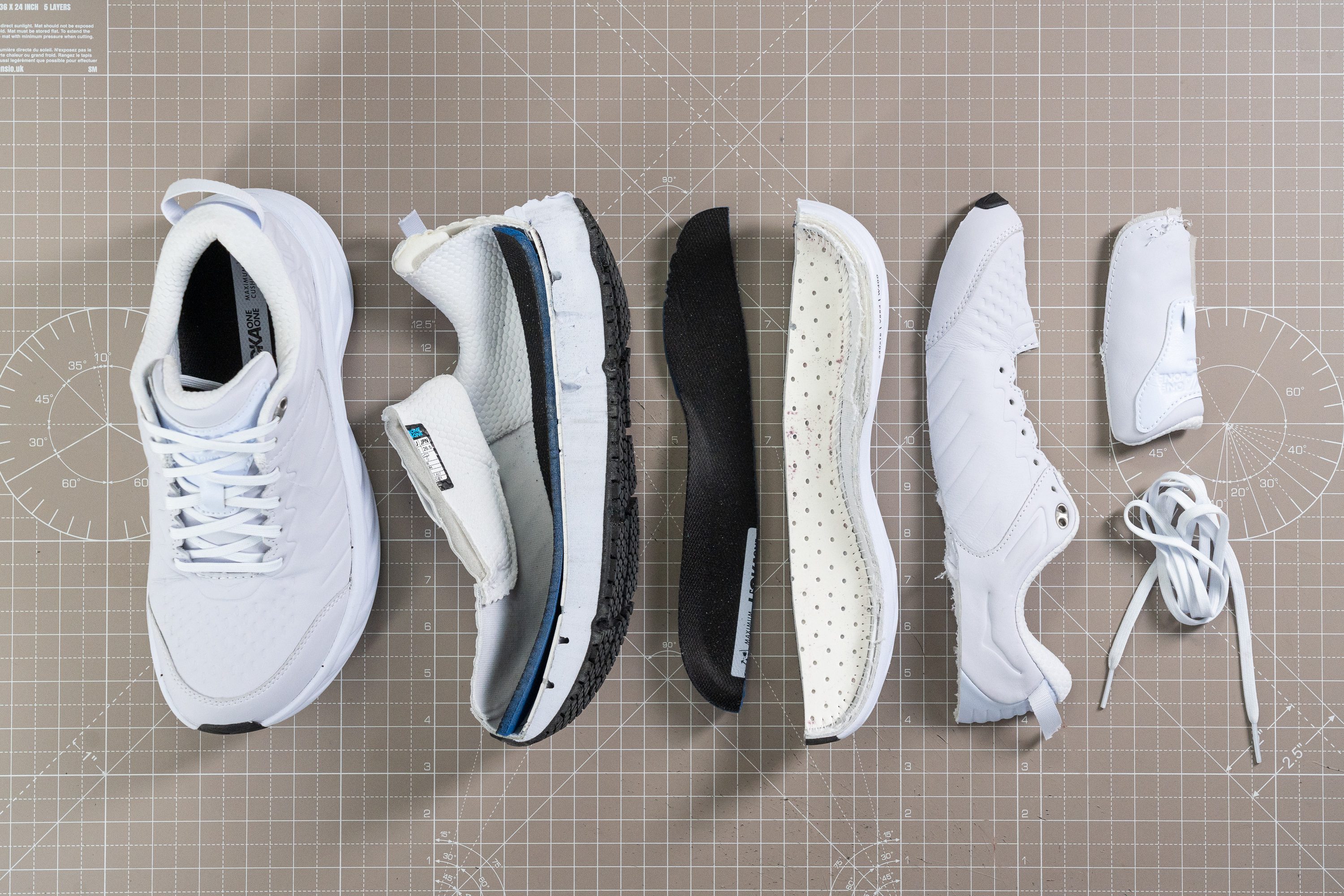
| Hoka Bondi SR | Yes |
Midsole softness in cold (%)
What's really amazing about the Bondi SR's cushioning is that it doesn't turn into a brick when exposed to low temperatures.
After sitting in our freezer for 20 minutes, the foam firmed up to 29 HA which is still 34% softer compared to how firm the other walking shoes got.
So, if you are planning to make it your fall/winter shoe, you can still enjoy the soft underfoot experience.
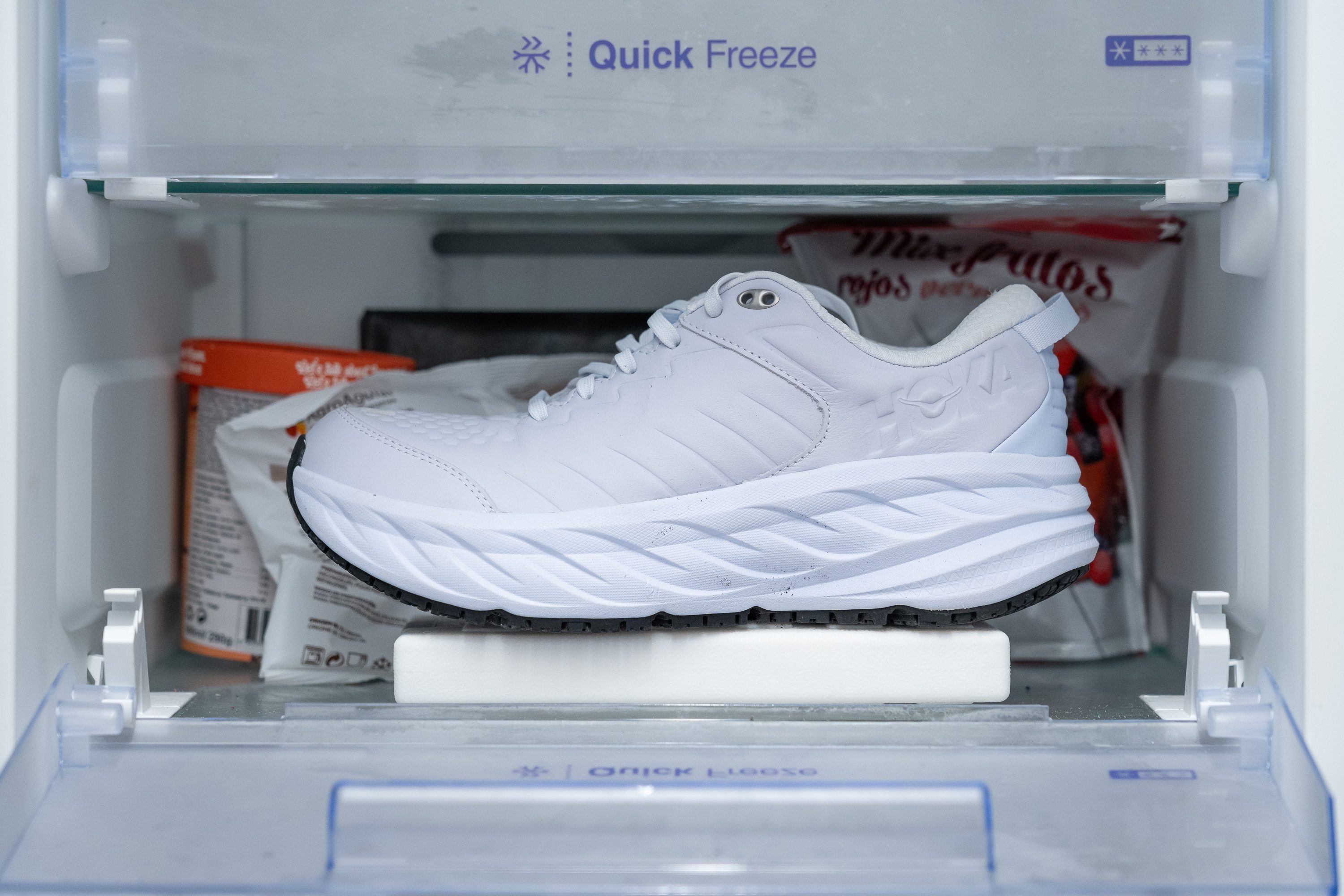
| Hoka Bondi SR | 42% |
| Average | 30% |
Tongue padding
Everything about the Hoka Bondi SR has to be superlative.
Now it's the tongue padding. Measuring its thickness with a calliper, we found it to be 11.1 mm thick! This is twice as big as the average tongue.
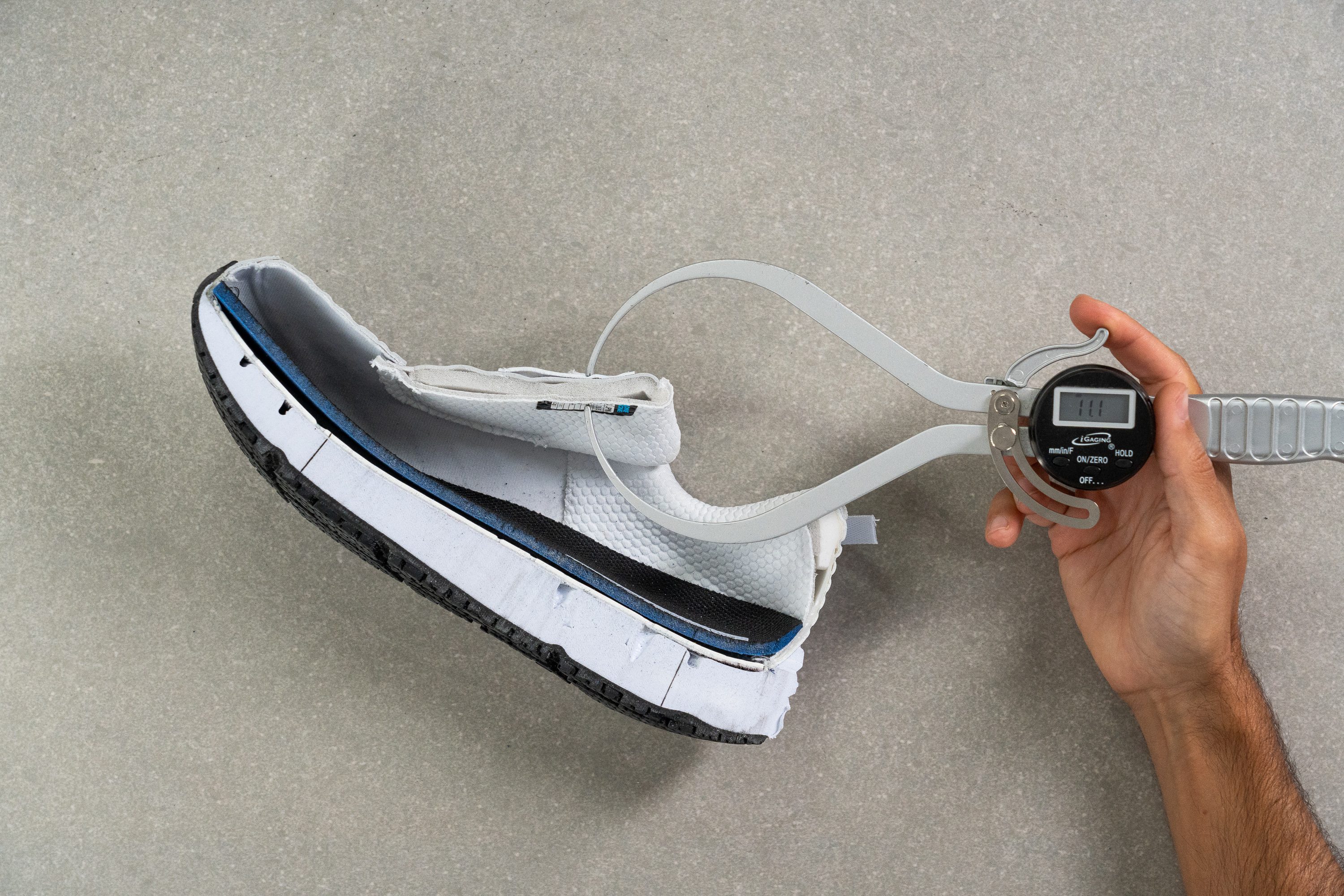
Maximising comfort is the shoe's Memory Foam collar padding. It made us feel as if our feet got sucked into some eternal "hugge."
| Hoka Bondi SR | 11.1 mm |
| Average | 5.6 mm |
Tongue: gusset type
The shoe's tongue has no gussets on the sides which is probably reasonable given how little breathability there is already.
But we didn't experience any issues with tongue shifting or bunching thanks to its massive padding.
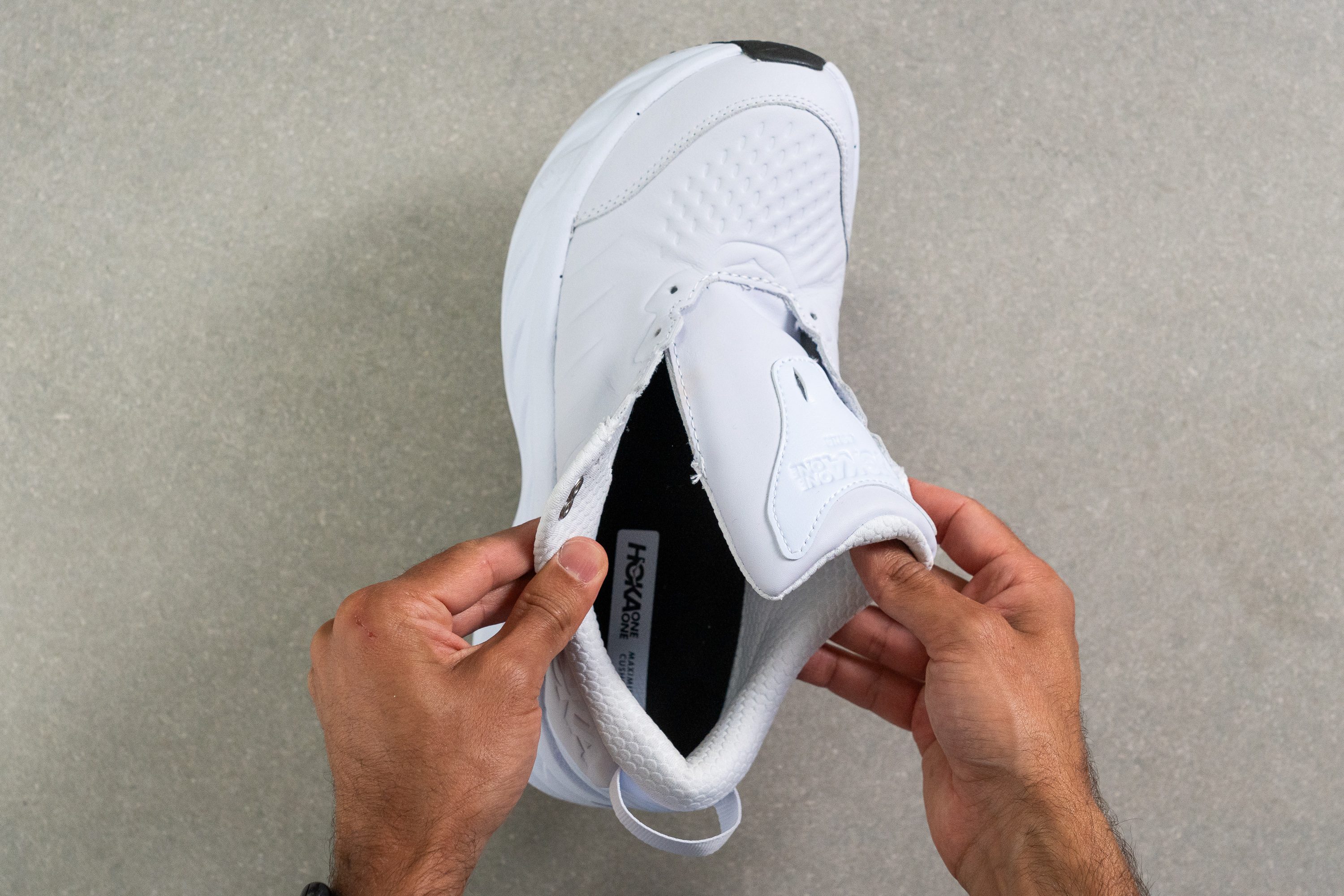
| Hoka Bondi SR | None |
Heel tab
A handy finger loop at the back helps you slide right into the shoe's comfortland much faster.
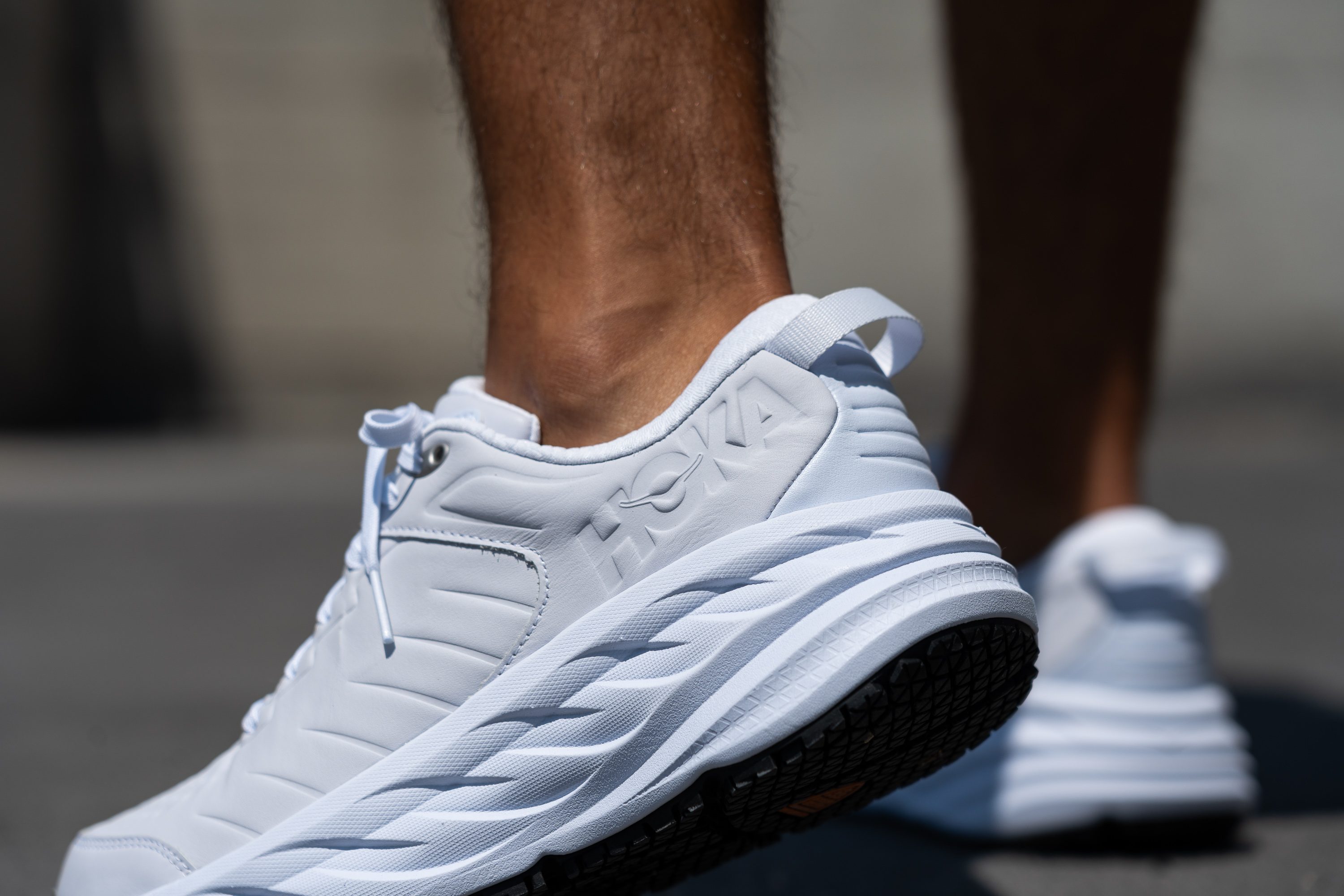
| Hoka Bondi SR | Finger loop |
Approved by podiatrists
The Hoka Bondi SR received a Seal of Acceptance from the American Podiatric Medical Association (APMA), which acknowledges that it is beneficial to foot health.
